Trade Schools, Colleges and Universities
Join Over 1.5 Million People We've Introduced to Awesome Schools Since 2001
Trade Schools Home > Programs > Trades > Marine & Watercraft Schools

Marine Mechanic Schools
Last Updated May 20, 2022
Marine mechanic schools offer training options designed to help you navigate toward a better life .
Does your ideal career involve spending a lot of time outdoors and working with all types of watercraft? A boat mechanic school can help you achieve that ideal. And right now could be an opportune time to enter this field. More than 87 million U.S. residents take part in recreational boating each year, and that number represents part of an overall rising trend. This growing interest in boating has resulted in increased demand for professionals who can build, maintain, and service boats.
So don't delay. Start the voyage toward a brighter future by entering your zip code into the search box below to find marine mechanic schools that offer programs near you!
8 Career Options for People Who Attend Marine Mechanic Schools
Sponsored Listings

J-Tech Institute
- Jacksonville, Florida
- Marine and RV Technology

Marine Mechanics Institute
- Orlando, Florida
- Marine Mechanic Training

According to 2021 data from the Occupational Employment and Wage Statistics program, the median marine mechanic salary was $46,730.* Plus, employment projections from the Bureau of Labor Statistics show that, on average, about 3,000 job openings are projected to become available each year in this trade from 2021 to 2031.* But these numbers are only based on mechanic positions. The reality is that completing a program at a marine mechanic school can help you qualify for multiple career paths.
Boat- and marine-related positions can be found with cruise lines, boat dealerships, outdoor department stores, marinas, watercraft manufacturers, and even the Navy and Marine Corps. You could uncover possibilities that never crossed your mind before now. So check out these eight job options that you may be able to pursue after attending a boat mechanic school:
1. Boat Rigger
Boat riggers take care of several tasks related to getting recreational and commercial boats ready for the water. They equip boats with important systems related to comfort, operations, and safety. In fact, their responsibilities often include installing propulsion systems, standing rigging, winches, anchors, bunks, furniture, lifeboats, and steering and throttle controls.
2. Dealership Technician
Dealership technicians are marine mechanics that work for a specific boat manufacturer or group of manufacturers. Many of these companies require certifications related to their product lines, and some marine mechanic programs include manufacturer-specific training to help you get started. So once you complete your schooling, you could choose to become a Certified or Master Technician with Mercury Marine, a Certified Master Technician with Yamaha Outboard, or a Certified Master Tech with Honda. You could also obtain several other manufacturer certifications with companies like Suzuki and Volvo Penta to help enhance your job prospects.
3. Gelcoat and Fiberglass Technician
Rather than focusing on mechanical aspects, you could begin a career in which you assess damage to a boat's gelcoat and fiberglass and then make repairs accordingly. Whether the boat is cracked, dented, gouged, scratched, or has structural damage, you can be responsible for restoring and maintaining its physical appeal, safety, and value.
4. Marina Service Manager
Many marinas offer repair services that could enable you to start out as a service technician and then work your way up to marina service manager. You would oversee the service team and may even be responsible for the yard crew that handles refueling and moorage services. Your daily tasks could include scheduling, creating work orders, billing customers, and managing inventory.
5. Marine Electrician
Marine electricians install, troubleshoot, and repair marine electronic and electrical systems, which could require working with blueprints and manuals or even drawing your own system diagrams. Some of the components that you may work with include batteries, chargers, solar panels, navigation systems, and satellite TV hardware.
If you opt for this career path, then you may want to consider obtaining additional industry certifications that many employers value. Options include Marine Electrical Certification through the American Boat and Yacht Council (ABYC) as well as Basic Marine Electronics Installer (MEI), Certified Marine Electronics Technician (CMET), or Advanced Marine Electronics Installer (AMEI) certifications through the National Marine Electronics Association (NMEA).
6. Marine Parts or Sales Associate

7. Marine Refrigeration and Air Conditioning Technician
Marine refrigeration and air conditioning technicians are sometimes referred to as mechanical systems technicians or marine HVAC service technicians. They rebuild and repair domestic and commercial refrigeration and air conditioning equipment, as well as hood and ventilation systems. They could also be responsible for maintenance services such as checking bearings, cycling, oil levels, and other components to ensure that units run properly. Some marine mechanics considering this career path opt to expand their expertise by training at an HVAC trade school .
8. Rig Shop Manager
Becoming a rig shop manager is something that you could work toward as a boat rigger. Once you build your experience, you may be able to take on a management position in which you could be responsible for overseeing rigging sales, customer service, training, and scheduling as well as creating and assigning work orders. You would likely work with rigging diagrams and measurements on a regular basis and may get to assist in the shop or out in the field with installations and repairs.
Begin the Voyage Toward a Successful Future
Take action today that could help you achieve career success sooner than you may have expected. Start out by entering your zip code into the search tool below to see which marine mechanic schools are offering programs near you!
* Unless otherwise noted, salary information is based on May 2021 data from the Occupational Employment and Wage Statistics (OEWS) program. Job growth and average yearly openings estimates are from the Bureau of Labor Statistics and are for the 2021 to 2031 period.

Service Locator
- Angler Endorsement
- Boat Towing Coverage
- Mechanical Breakdown
- Insurance Requirements in Mexico
- Agreed Hull Value
- Actual Cash Value
- Liability Only
- Insurance Payment Options
- Claims Information
- Towing Service Agreement
- Membership Plans
- Boat Show Tickets
- BoatUS Boats For Sale
- Membership Payment Options
- Consumer Affairs
- Boat Documentation Requirements
- Installation Instructions
- Shipping & Handling Information
- Contact Boat Lettering
- End User Agreement
- Frequently Asked Questions
- Vessel Documentation
- BoatUS Foundation
- Government Affairs
- Powercruisers
- Buying & Selling Advice
- Maintenance
- Tow Vehicles
- Make & Create
- Makeovers & Refitting
- Accessories
- Electronics
- Skills, Tips, Tools
- Spring Preparation
- Winterization
- Boaters’ Rights
- Environment & Clean Water
- Boat Safety
- Navigational Hazards
- Personal Safety
- Batteries & Onboard Power
- Motors, Engines, Propulsion
- Best Day on the Water
- Books & Movies
- Communication & Etiquette
- Contests & Sweepstakes
- Colleges & Tech Schools
- Food, Drink, Entertainment
- New To Boating
- Travel & Destinations
- Watersports
- Anchors & Anchoring
- Boat Handling
- ← Education
The Boat Lovers Guide to Marine Trade Schools
Advertisement
This exclusive roundup of training schools that prepare future boatbuilders, repairers, and technicians for careers in the industry, where highly trained personnel are in demand.
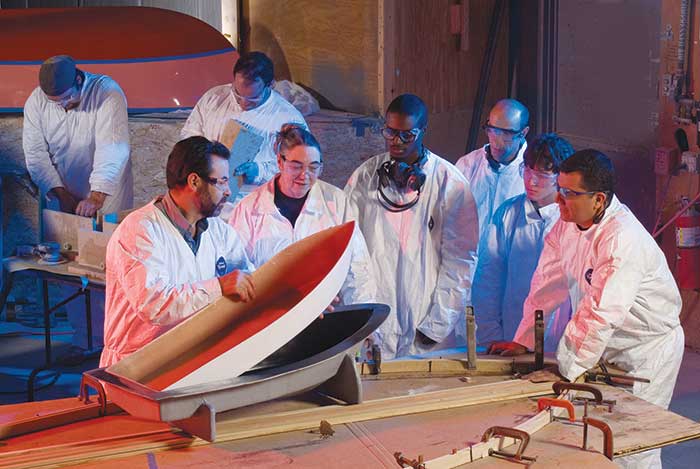
A learning curve in hull design at the New England Institute of Technology, Rhode Island.
For anyone who has thought about a career in the marine trades — say, as a boatbuilder, designer, or marine technician — there's a world of top-notch one- or two-year technical programs across the country created to open a direct path to a lifelong career in and around boats. Trade schools, community colleges, accredited certification programs — these are the focus of this BoatUS Magazine roundup of post-secondary schools. Some offer state or industry certification; others, an associate's degree. Still others offer both.
In exploring these courses, we see a trend that promises two sustainable branches for growth: one for the person setting off on a new career in the marine industry; the other for the deliberate raising of the bar on standards-based work across the field. Together these trends promise to keep boat owners boating and marine trade professionals in steady demand.
NMEC: Your Best Friend In Marine Education
The National Maritime Education Council offers the best gathering of online resources for anyone already working or looking to work in the marine trades. In addition to the list of schools, you can also find an industry-wide skills analysis, job descriptions, and timely interviews with industry leaders. What drove NMEC's establishment several years ago, according to Council Chair Steve Kitchin, was the concern about overall labor supply. Yet even in a 13-percent-unemployment economy, he says, "the concern about skilled labor supply is still one that should be on the front burner for all employers. Most of the job losses that we've experienced aren't necessarily a perfect transition to a skilled labor supply for the marine world."
NMEC, together with the ABYC and Professional Boatbuilder magazine and a host of marine companies, has worked for several years now to help both sides of that equation: maintain the labor supply for employers, yes, but also cultivate successful lifelong careers out of what may have earlier been dead-end boatyard jobs.
Starting With Standards
Roger Hellyar-Brook envisions a different future for boatyards. It's a future in which the staff to whom boat owners entrust the care of their second-biggest investment no longer rely on on-the-job training and a hit-or-miss approach to repairs. It's a future no longer built on the promise that "your boat will be ready Friday," when everybody — customer and technician alike — knows that's not likely.
"I call it the Lexus model of customer service," says Hellyar-Brook. "When you bring in your Lexus for service, you're offered coffee in a clean waiting room with sofas and TV and magazines to read. If it's a longer project, they'll even give you a loaner car. It may be more expensive, but if you're told the vehicle will be ready on Friday, you'll get it on Friday. And it'll be fixed right."
Hellyar-Brook is a former merchant mariner from the north of England and it doesn't take long to understand that this is a man who knows his trade. For over a decade, Hellyar-Brook has directed and taught the marine-systems program at The Landing School in Arundel, Maine. In addition to marine systems, The Landing School also offers programs in wooden boatbuilding, composite boatbuilding, and yacht design.
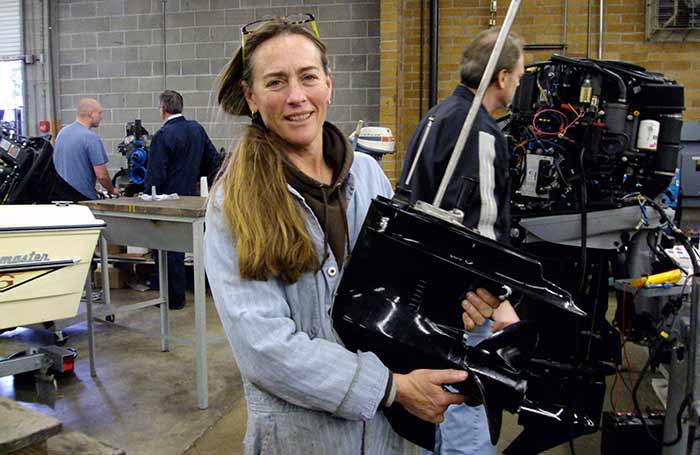
A student at Skagit Valley College, Washington, gets ready to install a lower unit.
Listen as Hellyar-Brook describes what he calls the Trojan Project: "Every year, just before Christmas, we give the students their first big independent homework. They have to go aboard this 30-foot twin-engine gas cruiser and document every system: sani, potable water, fuel, engine, starting and charging, all the DC and AC wiring. Then they do schematics, diagrams, a parts list. Does it comply with standards or not in all the wire gauges and hose sizes? And what about the compatibility of materials?" With the merest wink, Hellyar-Brook says one more thing about this particular aging vessel: "It's very atypical."
In the late 1990s, The Landing School pioneered a yearlong marine-systems curriculum that hews closely to the standards laid out and adopted by the American Boat and Yacht Council (ABYC). In fact, Hellyar-Brook was disappointed when the standards body began offering open-book tests for certification; he'd been turning out students who carried the standards in their heads.
Since then, other trade schools across the country have worked even more directly with the ABYC to write curricula that are in line and up to date with the latest needs of the industry the students are being trained to enter.
Until about five years ago, the International Yacht Restoration School (IYRS, pronounced "iris") in Rhode Island was known exclusively for its two-year boatbuilding and restoration program, which focuses on historic wooden yachts. But after talking with marine-industry leaders, the school explored which skills the industry most needed. What resulted from those conversations was the first comprehensive marine-systems curriculum fully co-written with the ABYC. That nine-month program graduated its third class in June.
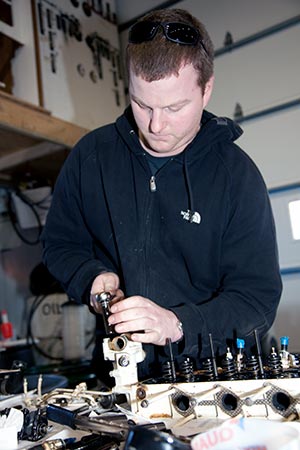
"We wanted to make sure of two things with this curriculum: that it's industry-based, and that it's written with both the standards and certification in mind," said Susan Daly, IYRS vice president of programming. "We wanted to both teach the standards and prepare anybody who goes through the curriculum to take the specific ABYC exams." This fall, IYRS added a nine-month composites technology program, also developed in close collaboration with industry leaders.
Both the IYRS and The Landing School offer "clock-hour" programs — students clock in at 8 a.m. and out at 4 p.m., five days a week, as they would on a work site. Historically, both schools have focused on intensive skills preparation leading directly to certification, although both have recently made agreements with nearby colleges to also offer degrees. Both schools attract students from all over the United States and abroad, with a mix of recent high-school graduates and mid-career folks.
The List: America's Marine Technical Programs
ABYC's Marine League of Schools * is comprised of post-secondary schools offering marine trade programs designated by ABYC's education department as meeting the needs of the marine service and/or manufacturing sector by providing ABYC standards-based educational programming.
- Alexandria Technical College (MN)
- Automotive Training Center (PA)
- Broward College (FL) *
- Cape Fear Community College (NC)
- Carteret Community College (NC)
- Cecil Community College (MD)
- Cedar Valley College (TX)
- Central Louisiana Technical Community College (LA)
- Chattanooga State Technical Community College (TN)
- College of the Albemarle (NC)
- The College of the Florida Keys (FL)
- EHOVE Ghrist Adult Career Center (OH)
- George Stone Career Center (FL)
- Grenada National Training Agency (GD) *
- Hennepin Technical College (MN)
- International Yacht Restoration School (RI)
- Iowa Lakes Community College (IA)
- Kingsborough Community College (NY)
- Kodiak College (AK) *
- Lake Washington Technical College (WA)
- Landing School (ME)
- Madison Area Technical College (WI)
- Marchman Technical Education (FL)
- Marine Mechanics Institute (FL)
- Maritime Professional Training (FL)
- Massasoit Community College (MA)
- McFatter Technical College
- Minnesota State Community and Technical College (MN)
- Motoring Technical Training Institute (MA)
- New England Institute of Technology (RI)
- North Dakota State College of Science (ND)
- North Georgia Technical College (GA)
- Northwest School of Wooden Boatbuilding (WA)
- Northwestern Michigan College (MI)
- Ocean County Vocational Technical School (NJ)
- Okaloosa Applied Technology Center (FL)
- Peninsula College (WA)
- Pinellas Technical Education Center (FL)
- Rappahannock Community College (VA)
- Santa Barbara City College (CA)
- Seattle Central Community College (WA)
- Skagit Valley College (WA)
- Suncoast Technical College (FL) *
- University of Hawaii, Honolulu Community College (HI)
- Westlawn Institute of Marine Technology (ME)
- Wisconsin Indianhead Technical College (WI)
- Wyotech (FL)
Two Career-Path Choices
If you're considering a marine technical school, you'll need to make two decisions. The first is which sector to train for — manufacturing or service. The second is whether to seek a certificate or a degree. The difference between training for manufacturing versus service comes down to how much of the curriculum teaches troubleshooting and problem-solving. The service sector obviously requires more of both, and it's during a recession that the distinction between the two becomes especially pronounced. "I've been through several economic downturns in the marine industry," said ABYC curriculum developer Ed Sherman. "I can tell you that in every instance, the service sector has always been the anchor that's held it all together in terms of jobs."
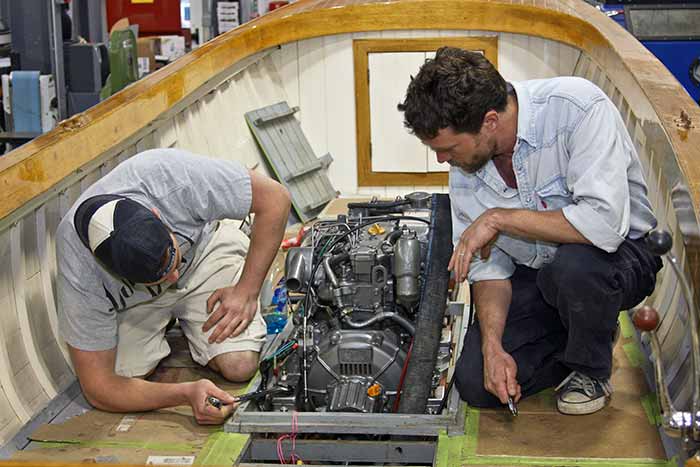
Students at the International Yacht Restoration School get to work on engine systems.
Recent information from schools bears that out. "Marine systems graduates are in the highest demand," said Nicole Jacques of The Landing School in June. "While new boats may not be designed and built in a poor economy, existing boats always need maintenance. Our marine systems program graduates often have several certifications and a broad, solid understanding of electrical, engines, plumbing, steering, etc., which makes them particularly valuable to employers in yards."
Daly at IYRS concurs. "We have seen particular strength in the service/maintenance and marina sectors. So our marine systems graduates have had good success in getting employed. There are pockets of growing demand in the restoration sector and again, our graduates have found jobs." The intensity of such clock-hour programs as described above focuses much of a student's attention on those problem-solving skills needed to service existing boats. It's also true that many students come in to these programs with degrees already in hand. "Half of our students already have college degrees when they arrive," said Daly.
But if you don't have a degree, your next big question is: certification or degree program? The big difference between them comes in the many general-education credits — English, math, social sciences — that students need in order to achieve an associate's degree. To get an idea of the proportion, IYRS's two-year boatbuilding and restoration program translates to one semester's worth of credits toward a two-year associate's degree from the Community College of Rhode Island.
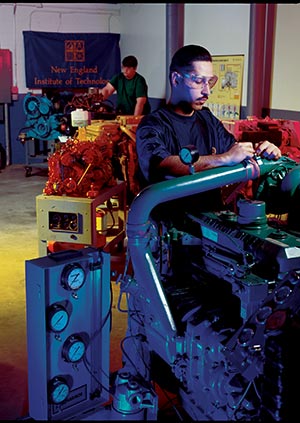
Steve Kitchin is the vice president for corporate education and training at New England Institute of Technology, as well as the chairman of the Marine Industry Training & Education Council (MITEC, see sidebar). "Every study that's been done about skills and the future of the American workforce," said Kitchin, "indicates that for long-term success, people who have degrees perform better in the labor market — both in terms of the options made available to them and in terms of their financial wherewithal."
If getting a degree is your biggest priority, programs affiliated with community colleges or universities may offer the most effective path. The key is to make sure the program you choose offers the course of study you want. For example, community colleges, by definition, reflect the needs of the region where they exist. So if you're looking for deep training in service, but you live in a region where boatbuilding prevails, you may want to look beyond the nearest school.
In an effort to promote the latest marine standards and mitigate local differences, ABYC (in collaboration with IYRS) launched in 2008 what it calls the Marine League of schools. Based on 13 modules — marine electrical, plumbing, fuel and water tankage, pumps, propane and natural gas, fire protection, steering, and others, with a healthy dose of troubleshooting throughout — the Marine League curriculum is now available at five community colleges around the country: The Boat School at Husson University in Eastport, Maine; Broward College in Miami, Florida; Honolulu Community College in Hawaii; Rappahannock Community College in Warsaw and Glenns, Virginia; and Skagit Valley College with a new facility in Anacortes, Washington. ABYC hopes to add a school in New England and the Great Lakes to its Marine League, according to Sherman.
"The beauty of the Marine League of schools is that we're now in the process of standardizing our instruction from coast to coast," said Skagit Valley's Mike Swietzer. "It's an even playing field now, and the workforce can intermingle wherever they choose to locate themselves. This is something that we've needed for quite a while."
Students at Skagit Valley in Washington state go through a core marine program in their first year, then specialize in the second year. "Our first-year program includes general boat studies, lofting, tools and safety, and engines. Students get a general knowledge of what the marine trades are all about, and in the first year, if they choose, they get their ABYC certification," Swietzer said. For their second year, students choose an area of specialization, ranging from boat production, boatyard repair, charter-boat repair, or independent employment. Gen-ed courses are designed to dovetail with each student's specialty.
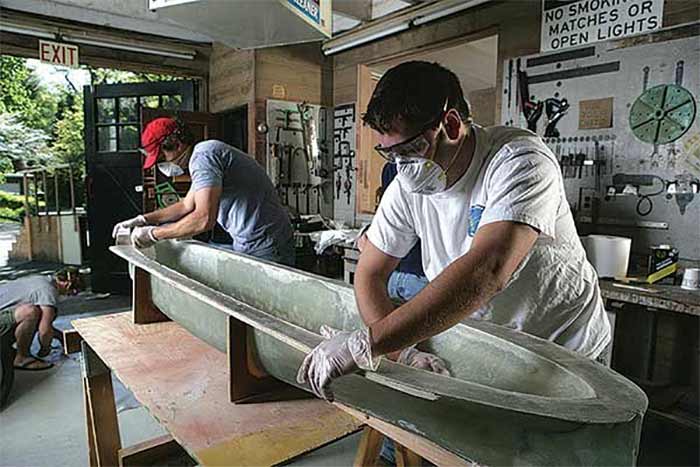
Engineering students get hands-on at the Webb Institute in Glen Cove, NY.
To find out more about marine trades programs near you and around the country, the best source of information comes from National Maritime Education Council (NMEC) .
Their website offers a comprehensive listing of training programs in the United States and abroad. Note that NMEC's list includes high school and post-secondary programs, as well as unaccredited programs geared more toward boat owners than aspiring marine professionals. Our version exclusively features U.S.-accredited post-secondary schools.
Accreditation by a well-regarded agency offers several advantages to prospective students. To achieve accreditation, schools need to demonstrate a solid track record, measured in graduation and placement rates, as well as the relevance of their curriculum. In many cases, it requires them to assemble an advisory board of leaders in the industry for which students are being trained. Perhaps most important of all, accreditation makes schools and their students eligible for such government financial-aid programs as Pell grants, Stafford loans, and others. Tuition for marine-technology programs, before financial aid, ranges from roughly $7,000 for Skagit Valley's two-year program to just under $20,000 for either IYRS's or The Landing School's 10-month programs, once you factor in tools and texts.
Earning Potential
For annual salaries, The Landing School tracks students after they enter the workforce and said entry-level boatbuilders tend to make low to mid-$30,000s; systems technicians tend to make high $30,000s to low $40,000s; yacht designers tend to make mid-$40,000s to mid-$50,000s.
The American Boat Builders & Repairers Association (www.abbra.org) compiles an annual Wage Rate Survey. The ABBRA report breaks wages down by marine-trade job and by region. To get an idea of the nationwide figures, an unskilled yard laborer in 2009 earned $16 per hour on average, with a range of $8 to $26. Mechanics earn an average hourly wage of $22; electronics technicians, $24; yard foremen, $24.75. A general manager can expect a median hourly wage of $36, with a range from $16 to $116.
Surveying The Horizon
As you browse the programs, ask yourself whether what you want to learn is close to home or worth traveling for. Or, if you don't want to leave home at all, check out such online programs as ProBoat E-training, sponsored by the publishers of Professional Boatbuilder magazine, or the distance-learning Westlawn program in yacht design, part of ABYC. By contrast, if traveling is exactly what you're after, try the marine technology program at Cape Fear Community College in Wilmington, North Carolina. "Our two-year technical program is unique," said department chair Jason Rogers. "All our students spent 32 days underway on our own dedicated training vessel, the 85-foot Dan Moore."
What you should look for from all these programs, though, is direct, hands-on learning. In the end, that's probably the biggest contrast between today's trade schools and four-year colleges. "I'm a product of a liberal-arts education," said Kitchin, "but the reality is, there weren't a bunch of employers telling my school what skills to give me in order to prepare me for the labor market. Here, we're not a research institution. We're a career institution." Indeed, if it's a career institution you're looking for, your world of choices has never looked better.
Related Articles
The truth about ceramic coatings for boats.
Our editor investigates the marketing claims of consumer-grade ceramic coatings.
Fine-Tune Your Side Scan Fishfinder
Take your side-scanning fishfinder off auto mode, and you’ll be spotting your prey from afar in no time
DIY Boat Foam Decking
Closed-cell foam flooring helps make boating more comfortable. Here’s how to install it on your vessel
Click to explore related articles
Contributing Editor, BoatUS Magazine
BoatUS Contributing Editor Tim Murphy is the author of "Adventurous Use of the Sea" (Seapoint Books, Nov 2022). He sails Billy Pilgrim, a 1988 Passport 40, on the U.S. East Coast. He develops marine trades curriculum for the American Boat & Yacht Council.
BoatUS Magazine Is A Benefit Of BoatUS Membership
Membership Benefits Include:
Subscription to the print version of BoatUS Magazine
4% back on purchases from West Marine stores or online at WestMarine.com
Discounts on fuel, transient slips, repairs and more at over 1,200 businesses
Deals on cruises, charters, car rentals, hotel stays and more…
All for only $25/year!
We use cookies to enhance your visit to our website and to improve your experience. By continuing to use our website, you’re agreeing to our cookie policy.

- Back to Marine Repair Technician
Marine Repair Technician Required Courses
- Career Outlook
- Required Courses
- Requirements and Application
Choose a campus to view contact information, or for general assistance, please contact us .
Rice Lake Admissions Contact
Nicole Messicci
Admissions Advisor
715.788.7144
Ashland Admissions Contact
Jennifer Bednarik
715.685.3039
New Richmond Admissions Contact
Jodi Saliny
715.752.8119
Superior Admissions Contact
715.319.7331

Get the Northwood Tech experience
Attend an event or schedule a campus tour/program shadow.
Visit Campus
Download the Catalog
Learn more about programs, courses, tuition and fees, services and more.
Download the 23-24 Catalog
Download the 22-23 Catalog
Finding the class you want to take has never been easier.
Find a Class
Download Required Courses by Campus
Choose a campus to view contact information, or for general assistance, please email us.
Marine Repair Technician (Fall 2024 - Term 1)
Suggested Course List
Marine Repair Technician (Spring 2024 - Term 2)
Marine Repair Technician Pathway Required Courses
2024-25 Spring Start
2022-23 (Spring Start)
2023-24 Spring Start
This program will be modified for the 2024-2025 academic year. For the revised required courses, please refer to the 2024-25 required courses document in the drop-down menu above. The required courses, including course descriptions, will be updated below on June 1, 2024, or will be available to view in the 2024-2025 catalog Spring 2024.
Program Courses
Outboard motors, marine electricity/electronics, marine welding, marine engine systems, outboard gear cases/rigging, sterndrive systems, introduction to can-bus systems, inboard engines, inboard transmission systems, marine diesel, marine engine computer control systems, general education courses, applied communications, applied math.
Total Credits: 42
Take the Next Step
Are you ready to experience success? Northwood Tech staff are standing by to support you in reaching your educational and career goals, so do it. Take the leap.

Ready to join Northwood Tech's successful graduates? Easily apply today.
Apply for Free
Start here to begin your Northwood Tech journey. Learn about programs, admissions and more.
Request Information
Northwood Tech's admissions advisors are available to answer your questions.
Contact an Advisor

- Virtual Tour
- Request Info
Shortcuts for
- Prospective Students
- High School Students or Educators
- Alumni & Friends
- Areas of Study
- Degree Types
- View All Programs
- University Catalog
- Student Support & Resources
- College of Health Sciences
- Undergraduate Admissions
- Graduate Admissions
- Transfer Applicants
- International Admissions
- Tuition & Fees
- Financial Aid & Scholarships
- Accepted Students
- Early College Program
- About Our Campus
- Housing & Dining
- Student Health & Wellness
- Student Activities & Recreation
- Events Calendar
- Workforce Development
- Employer Resources
- News & Media
- Safety & Security
- Public Disclosure
- Commencement 2024
- COVID-19 Announcements
Home Academic Programs Associate Degrees Marine Technology, AS
- Marine Technology, AS
Program Mission, Goals, and Outcomes
Courses offered, q&a and technical standards, program overview.
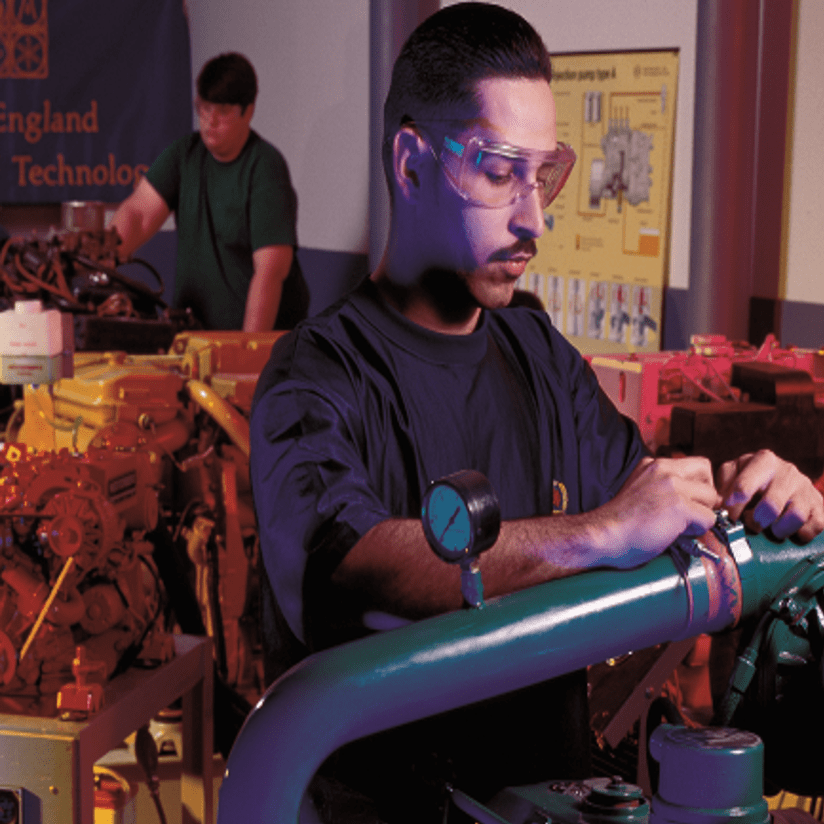
In the Associate in Science degree program in Marine Technology, you will develop hands-on skills in the installation, service, and repair of mechanical, electrical, electronic, and hydraulic systems used by both recreational and commercial boats and ships. The Marine Technology program will give you the opportunity to achieve factory technician certification in repairing Volvo Penta and Yamaha propulsion systems. This will prepare you for entry-level positions in boatyard operations, boat and shop manufacturing, engine repair, marine electronics installation, and more. Upon graduation, students become members in the American Boating and Yacht Council (ABYC).
Full Description
The Marine Technology program offers an associate degree in Marine Technology and Advanced Marine Technology and a Certificate in Marine Technology. Theory and practical training in boat and ship mechanics, marine focused business concepts, marine electrical, and marine systems installation, repair and service are the thrust of the program. Hands-on practical skills in installation, service, and repairs to mechanical, electrical, electronic, and hydraulic systems utilized by both recreational and commercial boats and shops are stressed throughout the curriculum to reinforce the in-depth theory classes. In addition, marine business procedures are taught using computerized learning methods with marine-specific software.
The Advanced Marine Technology degree program offers an additional term of study in some of the more advanced electronics and computer controls common in the industry today.
Graduates of the associate degree program are skilled boat technicians ready for entry-level positions in such areas as marina/boatyard operations, boat and shop manufacturing, marine engine repair, support services for commercial boats and shops, engine room staff aboard commercial vessels, marine electronics installation, and marine wholesale/retail product sales.
Graduates of this program are eligible to continue on for a Bachelor of Science Degree in Business Management to further their credentials.
Faculty members in Marine Technology are factory-certified by ABYC, Volvo, and Mercury Marine. The Marine Technology Department is the New England training site for Volvo Penta Marine with advanced training available for qualified students. Students completing the Marine Technology program may also qualify to become certified Volvo Penta Technicians.
ACCREDITATION STATUS
NEIT’s Associate in Science in Marine Technology program is an ABYC (American Boat and Yacht Council) Marine League of Schools member. The Marine League of Schools is comprised of post-secondary schools offering marine trade programs that provide ABYC standards-based educational programming. The Marine Technology program is conditionally accredited by the Marine Trades Accreditation Program , ABYC Foundation, 613 Third Street, Annapolis, MD 21146, 410-990-4460, ext. 200, [email protected] .
Potential Career Opportunities
The marine mechanic training will provide both the knowledge and skill needed to repair, maintain, and rebuild electrical systems, boat engines, motors, and other marine instruments.
Graduates of marine mechanic schools will find plenty of job openings in repair shops, though they may also find work on docks and marinas performing on-site overhauls for larger crafts like commercial fishing boats or private vessels.
The hands-on-experience provided by NEIT will also qualify individuals for careers in specialty positions across the boating and marine industry. Upon graduation, attainable marine service titles may include:
Marine Technician
Marine Systems Installer
Engine Builder
Franchise Dealership
The associate program in Marine Technology will take 18 months to complete. In addition to the hands-on-training provided at NEIT, graduates may be required to acquire additional certifications before they can begin work in the field.
The American Boat and Yacht Council (ABYC) is a recognized authority in the industry and offers certificate programs including specialty certification classes. Individuals must pass three out of the eight offered to become Master Marine Technicians.
Becoming a certified marine mechanic involves a few different steps. First, students must pursue an associate degree or equivalent. There, they will gain the skills needed to perform entry-level work. One to two years of on-the-job experience is recommended before pursuing certification.
After that window, individuals are encouraged to browse the programs offered by the ABYC. The organization offers certifications in subjects such as AC/Refrigeration, Diesel Engines, and Advanced Marine Electrical.
Certifications are valid for five years. After that, individuals must pass a recertification exam to maintain their status.
Job prospects for marine mechanics remain promising. According to the Bureau of Labor Statistics, motor vehicle dealers remain the number one source of employment for motorboat mechanics and marine service technicians. These positions may require specific training related to their product lines. The boat building and repair and maintenance industries are also major employers of individuals involved in the marine trades.
Related Programs
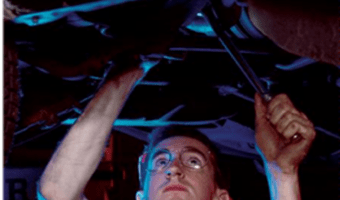
Automotive Technology, AS
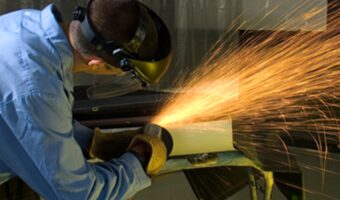
Automotive Collision Repair Technology, AS
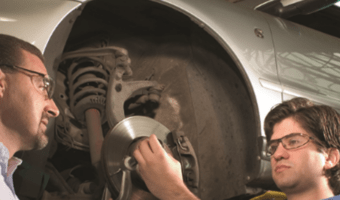
Automotive Technology with High Performance, AS
Program mission.
The mission of the Marine Technology program (MT) is to train entry-level technicians for employment in the marine field as well-rounded electrical and mechanical diagnostic technicians. Through the use of practical lab exercises and classroom experiences the student will gain knowledge in electrical theory, outboard engine repair, marine gas and diesel inboard repair, transmissions and navigation. Students will be well versed in ABYC standards through the use and reference to the standards manual throughout their program. Through participation in both lab and classroom experiences the successful student will gain the knowledge and experience necessary to be awarded an Associate in Science degree.
Program Goals
- The MT program will provide the students with the necessary experiences to become employed in a marine repair and/or manufacturing facility.
- The MT program will provide the students with an exposure to the ABYC standards employed in the field of marine vessel construction and repair.
- The MT program will strive to instill in the students a professional work ethic.
- The MT program will provide the students with the knowledge of workplace hazards and safe working practices to be used when working around the waterfront or in the presence of travel-lifts and other hoisting equipment.
Program Outcomes
Students successfully completing the Marine Technology program will be able to:
- Perform basic marine engine installation, diagnostics, tune ups, and repairs using the appropriate industry required service literature.
- Properly perform electrical installations, and troubleshoot, diagnose, and repair electrical devices according to ABYC standards and industry related service literature.
- Properly remove service, reinstall, align, and adjust marine drive systems and controls.
- Properly create repair estimates, repair orders, and marina service records required for the successful operation of a marine business.
- Demonstrate and understand environmental laws, Clean Marina protocols and EPA requirements associated with working in the marine industry for both fresh and salt water areas.
For the latest listing of courses offered, please review our University Catalog here .
Questions & Answers
- When do my classes meet? Day Classes: Technical classes normally meet for at least three hours a day for up to five days a week. Classes normally begin in the early morning (7:45 a.m.), late morning (usually 11:25 a.m.), or mid-afternoon. A technical time slot may vary from term to term.Evening Classes: Technical classes meet on the average of three nights a week, although there may be times when they will meet four nights a week. Classes normally begin at 5:45 p.m.In addition, to achieve your associate degree, you will take a total of approximately eight liberal arts courses, which will be scheduled around your technical schedule over the course of your entire program. Each liberal arts course meets approximately four hours per week. Liberal arts courses are offered days, evenings, and Saturdays.At the beginning of each term you will receive a detailed schedule giving the exact time and location of all your classes. The College requires that all students be prepared to take classes and receive services at any of NEIT’s locations where the appropriate classes and services are offered.When a regularly scheduled class falls on a day which is an NEIT observed holiday (Columbus Day, Veterans Day, Martin Luther King, Jr. Day, and Memorial Day), an alternate class will be scheduled as a make up for that class. The make-up class may fall on a Friday. It is the student’s responsibility to take note of when and where classes are offered.
- How large will my classes be? The average size for a class is about 20 to 25 students; however, larger and smaller classes occur from time to time.
- How much time will I spend in lab? Almost half of your technical courses consist of laboratory work. In order for you to get the most out of your laboratory experiences, you will first receive a thorough explanation of the theory behind your lab work.
- Where do my classes meet? Students should be prepared to attend classes at any of NEIT’s classroom facilities: either at the Post Road, Access Road, or East Greenwich campus.
- I have not earned my high school diploma or GED: can I enroll in an Associate Degree Program? A candidate for admission to an associate degree program must have a high school diploma, have earned a recognized equivalency diploma (GED), or meet the federal home school requirements.
- How long should it take me to complete my program? To complete your degree requirements in the shortest possible time, you should take the courses outlined in the prescribed curriculum. For a typical six-term curriculum, a student may complete the requirements in as little as 18 months.To complete all your degree requirements in the shortest time, you should take at least one liberal arts course each term. Students who need more time to complete their curriculum may postpone some of the liberal arts courses until after the completion of the technical requirements. Students are provided up to two additional terms of study to complete the liberal arts requirements without any additional tuition assessment fee. During these additional terms of study, students are required to pay all applicable fees.Students may also elect to complete some of their liberal arts requirements during Intersession, a five-week term scheduled between Spring and Summer Quarters. Students will not be assessed any additional tuition for liberal arts courses taken during the Intersession but may be assessed applicable fees.Students wishing to extend the number of terms needed to complete the required technical courses in their curriculum will be assessed additional tuition and fees.
- Is NEIT accredited? NEIT is accredited by the New England Commission of Higher Education. Accreditation by NECHE is recognized by the federal government and entitles NEIT to participate in federal financial aid programs. Some academic departments have specialized professional accreditations in addition to accreditation by NECHE. For more information on accreditation, see NEIT’s catalog.
- Can I transfer the credits that I earn at NEIT to another college? The transferability of a course is always up to the institution to which the student is transferring. Students interested in the transferability of their credits should contact the Office of Teaching and Learning for further information.
- Can I transfer credits earned at another college to NEIT? Transfer credit for appropriate courses taken at an accredited institution will be considered upon receipt of an official transcript for any program, biology, science, and mathematics courses in which the student has earned a “C” or above within the past three years and for English or humanities courses in which the student has earned a “C” or above within the last ten years. An official transcript from the other institution must be received before the end of the first week of the term for transfer credit to be granted for courses to be taken during that term. Students will receive a tuition reduction for the approved technical courses based on the program rate and will be applied against the final technical term of the curriculum’s tuition amount. No tuition credit is provided for courses which are not a part of the technical curriculum.
- What is the “Feinstein Enriching America” Program? New England Institute of Technology is the proud recipient of a grant from the Feinstein Foundation. To satisfy the terms of the grant, the College has developed a one-credit community enrichment course which includes hands-on community enrichment projects. The course can be taken for a few hours per term, spread over several terms. Students who are already engaged in community enrichment on their own may be able to count that service towards course credit.
- How many credits do I need to acquire my Financial Aid? In order to be eligible for the maximum financial aid award, you need to maintain at least 12 credits per academic term.
- What does my program cost? The cost of your program will be as outlined in your enrollment agreement, along with your cost for books and other course materials. Students who decide to take more terms than the enrollment agreement describes to complete the technical courses in their curriculum will be subject to additional fees and possible additional tuition costs. Students who elect to take the technical portion of the degree requirements at a rate faster than the rate prescribed in the curriculum and the enrollment agreement will be assessed additional tuition.Students who require prerequisite courses will incur additional tuition and fees above those outlined in their enrollment agreement.If a student elects to take a course(s) outside of the prescribed curriculum, additional tuition and fees will be assessed.Remember, students who withdraw and re-enter, one time only, pay the tuition rate that was in effect for them at the time of their last day of attendance for up to one year from their last day of attendance. Second re-entrees and beyond pay the tuition rate in effect at the time they re-enter. The most economical way for you to complete your college degree is to begin your program now and continue your studies straight through for the six terms necessary to complete your degree requirements.
- What kind of employment assistance does NEIT offer? The Career Services Office assists NEIT students and graduates in in all aspects of the job search, including resume writing, interviewing skills, and developing a job search strategy. Upon completion of their program, graduates may submit a resume to the Career Services Office to be circulated to employers for employment opportunities in their fields. Employers regularly contact us about our graduates. In addition, our Career Services Office contacts employers to develop job leads. A strong relationship with employers exists as a result of our training students to meet the needs of industry for over fifty years. No school can, and NEIT does not, guarantee to its graduates employment or a specific starting salary.
- Where will job opportunities exist? Graduates have obtained employment in the local area. However, one of the most exciting aspect of this program is the ability to look nationally for employment opportunities.
- What kind of jobs will I be qualified to look for? Generally, jobs will exist in the marine/repair service and sales aspect of Marine Industries. The U.S. Department of Labor Occupational Handbook predicts that job opportunities in the marine industry will grow at a faster than average rate with the greatest potential in the newer technologies such as marine electronics and electrical systems. Competition for jobs will be keen and requirements will increasingly emphasize and applicant’s training and education. The job best suited to you will depend upon your individual strengths and interests.
- Is there any state or federal licensing required in my field? No license is required for any of the careers which you will be preparing to enter. The Marine Technology program is not designed to prepare a student for a licensure exam.
- Will I be required to wear special clothing? Yes. Each student is required to purchase and wear uniform shirts. In addition, proper tan work pants must be worn (no jeans, sweatpants, nylon pants, shorts, tattered, too tight or oversized pants). Students must have purchased their uniforms and be wearing them to class and lab by the end of the third week of classes. Students who have not purchased their uniforms and/or who do not wear their uniforms will not be allowed to attend class after the third week of classes. Also, proper footwear such as good quality work boots are to be worn at all times. No sneakers, sandals or soft type footwear, shorts and tee shirts are allowed at any time.
- Will I be required to wear any special safety equipment? Yes, eye and ear protection must be worn when performing special tasks or in areas that require them. Students are responsible for the purchasing of proper eye protection and must be carried on them at all times. Eye protection must be worn at all times in the automotive labs. Ear protection is supplied by the College. Also, as a safety precaution, work shoes or boots must be properly laced and tied at all times, shirts must be worn tucked in pants, and no rings, watches, earrings, nose rings and or dangling jewelry is allowed during lab or shop conditions.
- Must I attend classes during the summer 5-week intersession? Students who wish to receive a Bachelor’s Degree in Business Management, without transfer credits from another college, may need to complete two of their core electives during the summer intersession.
Technical Standards
These technical standards set forth by the Automotive/Autobody and Marine Technology Departments, establish the essential qualities considered necessary for students admitted to these programs to achieve the knowledge, skills and competencies to enter these fields. The successful student must possess the following skills and abilities or be able to demonstrate that they can complete the requirements of the program with or without reasonable accommodation, using some other combination of skills and abilities.
Cognitive Ability
- Ability to obtain a score of 3 or higher on a ten point scale mechanical reasoning test.
- Ability to read and understand warning labels associated with various hazardous chemicals.
- Ability to learn, remember and recall detailed information and to use it for problem solving.
- Ability to deal with materials and problems such as organizing or reorganizing information.
- Ability to use abstractions in specific concrete situations.
- Ability to break information into its component parts.
- Ability to understand spatial relationships.
- Possession of basic math skills through addition, subtraction, multiplication and division of whole numbers and fractions using both the U.S. and Metric systems of measurement.
- Ability to perform tasks by observing demonstrations.
- Ability to perform tasks by following written instructions.
- Ability to perform tasks following verbal instructions.
- Possession of basic keyboarding skills and knowledge of computer programs.
Communications Skills
- Ability to communicate effectively with faculty and students.
- Ability to demonstrate and use the knowledge acquired during the classroom training process and in the lab setting.
Adaptive Ability
- Ability to maintain emotional stability and the maturity necessary to interact with other members of the faculty and students in a responsible manner.
Physical Ability
- An ability to work in a standing, sitting, squatting, kneeling, or lying position.
- An ability to lift, lower, push, and pull using both arms and legs.
- Ability to lift objects weighing up to 35 pounds.
- Ability to stand on a hard surface, usually concrete, for 4-6 hours at a time.
- Sufficient upper body strength to carry 20 pounds.
- Sufficient strength and agility to lift equipment and move large pieces of equipment independently.
- Sufficient strength and agility to grasp and maintain tension for long periods of time.
- Ability to wear and tolerate ear plugs, safety glasses and other protective equipment.
- Ability to perform learned skills, independently, with accuracy and completeness within reasonable time frames in accordance with procedures.
Manual Ability
- Ability to manipulate wrenches, screwdrivers, and other tools.
- Sufficient motor function and sensory abilities to participate effectively in the classroom laboratory.
- Sufficient manual dexterity and motor coordination to coordinate hands, eyes and fingers in the operation of tools and other equipment.
Sensory Ability
- Visual ability, with or without correction, to enable the student to differentiate automotive tools and instruments, wires, and components.
- Acute enough to read small print.
- Acute enough to read small numbers on precision measuring instruments.
- Acute enough to hear and understand words spoken by others in an environment with a high level of noise in the background (such as, but not limited to: airguns, engine
- Connect With a School Now!
- Marine Mechanic Programs
- Trade School Programs
- Mechanic Programs
Find accredited marine mechanic certification training programs (small engine repair) at trade schools and technical colleges near you. Find a school with specialized technology training available like: watercraft , learn to diagnose, repair and overhaul speedboat, pontoon, jet-ski, outboard motor and more.
Use the search application to connect with a mechanic training program.
“ What does a marine mechanic do?
It’s a marine mechanic’s job to make sure all types of water crafts are working optimally. A day in your life, should you become a marine mechanic, would look a little something like this:
- Work on boats and other water vehicles.
- Discuss with the customer the work that is needing to be done.
- Perform all the typical routine maintenance. [ read more ]”
Schools with Marine Mechanic Training
- Automotive Training Center
- Marine Mechanics Institute
- Universal Technical institute
“ The median salary for boat mechanics is $39K. What that actually means is that half of the occupation makes more, while half makes less. However, where you work, which state you’re in, and how much experience you have will be the determining factors around what your salary will look like. “[ref]
The schools listed here are accredited and have online programs , some evening and weekend classes, financial aid assistance for those who qualify and job placement services too.
- What Does a Marine Mechanic Do?
- Becoming a Mechanic
- Trade School Financial Aid Guide
Search Top Trade School
Top trade school articles.
- A Comprehensive Guide to “Skilled Trades”
- List of Skilled Trades for Women
- Getting Into Trade School Without a High School Diploma
- Skilled Trade Careers with Apprenticeships and On-the-Job Training
- Construction Manager Job Description and Career Path
Find CDL Training
CDL Training Near Me
Truck Driving Jobs
Warehouse Jobs
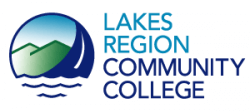
- Course Schedules
- Course Catalogs
- Course Descriptions
- Academic Calendars
- NH Rural Renewables
- Admissions Overview
- New Students Quick Start
- High School Programs
- Schedule a Tour
- Open Houses & Special Events
- Financial Aid
- Financial Aid FAQs
- Scholarships & Grants
- Tuition & Fees
- Veterans Information
- Promise Program
- Student Support
- IT Help Desk
- Campus Safety
- Student Senate
- Career Resources
- Transfer Opportunities
- Countdown Cafe
- Community Table
- President’s Message
- Title IX Resources
- Event Calendar
- Employment Opportunities
- Accreditation
- Strategic Plan
- History of LRCC
- College Advisory Board
- Consumer Information Disclosures
- Notice of Non-Discrimination
- Diversity, Equity, and Inclusion
- Covid-19 Information
Marine Maintenance
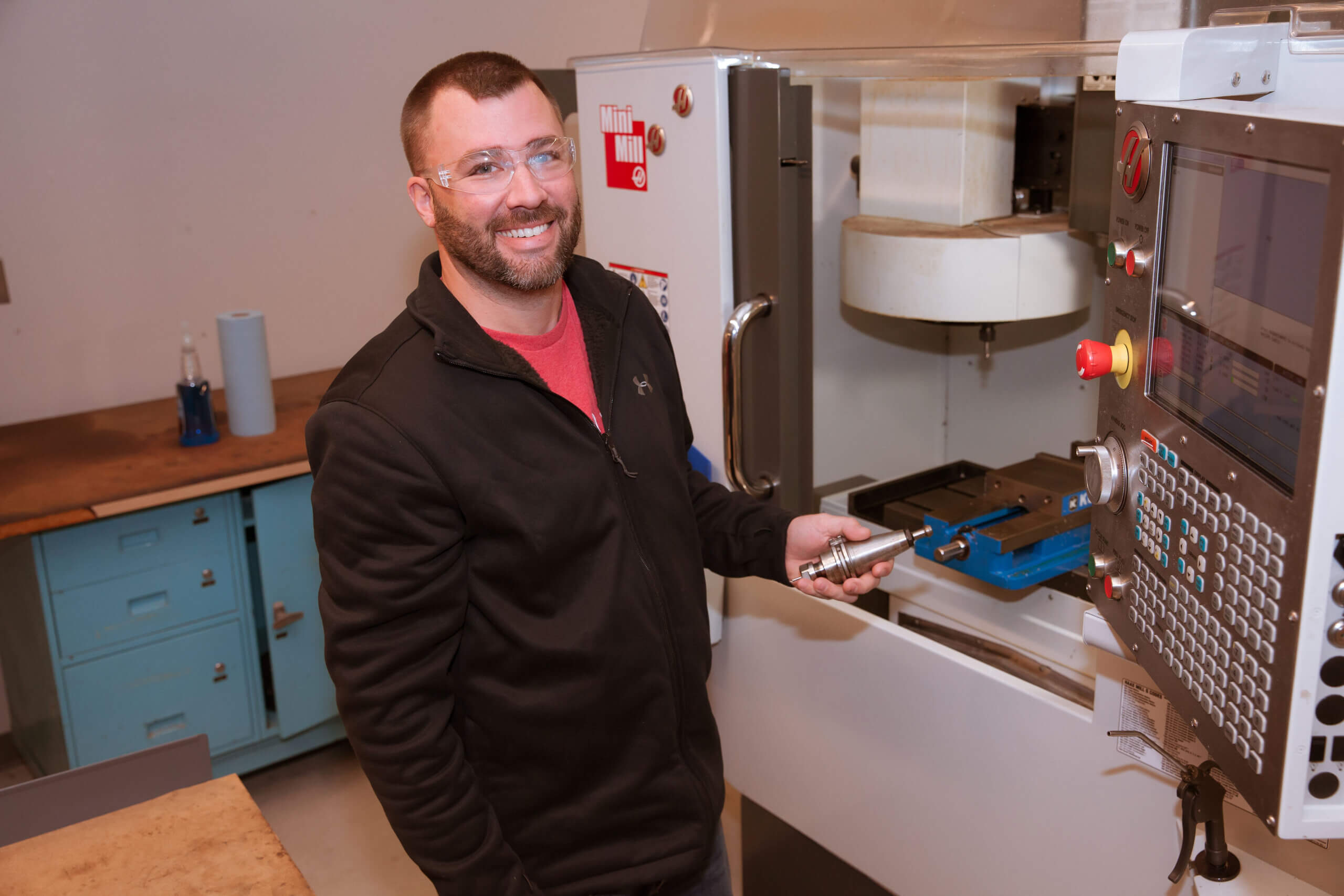
Program Overview
The Marine Maintenance certificate is a seven-month program that starts in the fall semester. Classes meet twice a week, and students are encouraged to work part-time in a marine setting while completing the program. Lakes Region Community College has established partnerships with more than 30 marinas throughout New England and works closely with students to place them.
Upon successful completion of the program students will earn both a Certificate in Marine Maintenance from LRCC and Mercury Maintenance Certification from Mercury Marine.
Additional degree options are available for students who wish to continue studying for an associate degree.
Industry reports show an annual growth of 5% in this trade, with a shrinking supply of qualified technicians. Job opportunities are more abundant than ever!
Job opportunities for marine technicians can be found in coastal and lakeside communities. Graduates will find employment as inboard drive, or outboard technicians. Many other opportunities in recreational off-road marketing, such as motorcycle and snowmobile technician, are also available.
Skills Learned:
- Winterizing I/O and OB
- Trailer maintenance
- Engine tune-ups
- I/O drive service
- Cooling systems, including water pumps
- Rigging, engines, controls and wiring
- Fuel system service
- Bilge pumps
- Navigational lighting
- Trailer lighting
- Starting and charging systems
- Basic testing
Course Sequencing
Certificate requirements.
Candidates for Marine Technology must:
- Have command of the English language;
- Have a high school diploma or equivalent;
- Be able to purchase the minimum required tools;
- Be able to work in a marine service environment;
- Be able to work in confined spaces;
- Be able to complete requirements for college level classes;
- Be able to understand and follow both written and oral instructions;
- Have sufficient vision to distinguish colors, read gauges, scopes, diagnostic equipment, and information from a computer screen (adaptive equipment acceptable);
- Have reading comprehension skills sufficient to read and comprehend service literature;
- Have communication skills sufficient to prepare required reports;
- Have sufficient hearing to distinguish various sounds and noises (adaptive equipment acceptable);
- Have the ability to stand for extended periods of time and the physical strength to lift components and equipment;
- Have sufficient dexterity to perform manual skills related to marine service
Jacob Marsh
Certificate Program Fees (PDF)
Annual salary range in NH for a Marine/Power Sports Technician
Program Contact
[email protected]
Contact LRCC (603) 524-3207 [email protected] 379 Belmont Rd Laconia, NH 03246
- Privacy Policy
- Non Discrimination Policy
- Accessibility Policy
© 2024 - Lakes Region Community College
everythingaboutboats.org
Everything about boats – the ultimate reference resource for boaters.

Fiberglass Boat Building & Repair Course
PATH: Boat Building & Refitting » Boat Building & Refitting Schools » Anchors Aweigh Academy » PATH: Boat Inspection » Marine Surveying Schools » Anchors Aweigh Academy » PATH: Do-It-Yourself » Schools & Classes » Anchors Aweigh Academy »
PAGE CONTENTS: ( click ⇒ to go to each section on this page ) ⇒ Course Overview: Syllabus, Cost,+. Link to Anchors Aweigh Academy . ⇒ ^ Online Portion of Course: Procedures, Certificate,+ . ⇒ ^ Hands-On Portion of Course: Procedures, Certificate,+ . ⇒ ^ ^ Hands-On Class Locations, Dates. Hours, Maximum Students,+ . ⇒ Listing of All Academy Courses (Online − Hands-On) . ⇒ Visit EAB's FEATURED ARTICLES Home Page to preview the vast scope of our website . ⇒ This Month's Top 20 Most Popular Articles on our EAB website . ⇒ Layout of the EverythingAboutBoats.org Website's Pages: Page Types, Contents, Topics, + . ⇒ What our nonprofit Anchors Aweigh Academy and its EAB website have accomplished . ⇒ Members must SIGN IN to gain access to Members Only areas of this website . ⇒ Become an Academy Member and gain access to additional pages and programs ! ⇒ Comments: Submit To ⇒ Comments♣EverythingAboutBoats.org (Replace "♣" with "@").
This course is currently undergoing revision into the Online and Hands-on formats. If you would like to be notified when this course becomes available, please send an email to: Editor♣EverythingAboutBoats.org (Replace "♣" with "@")
See EAB’s Anchors Aweigh Academy article for more details, contact information, PLUS information about our other products.
The Online portion of the course is offered with open enrollment and students may complete it at their own pace. A Certificate of Completion is awarded after successful completion of the Online Exam. Successful completion of the Online portion of the course is prerequisite to the Hands-On portion of the course.
The On-Site Hands-On portion of the course consists of five 3 hour modules for a total of 15 hours and is conducted at various locations around the United States (and beyond). A Certificate of Completion is awarded after successful completion of the Hands-On projects.
*Class Schedule Key
- Dates are expressed YYMMDD∼DD. Example: 220913∼17 = September 13∼17, 2022. (The dates may extend into the next month. Example: 220927∼1 = Sept 27 ∼ Oct 1, 2022)
- W = Weekend (Sat 8am∼6pm with lunch at 11∼12 + Sun 1pm-7pm).
- D = Day (8am∼6pm with lunch at 11∼12 + a partial day).
- M = Morning (8am∼11am) = 3 hours per day. Mon∼Fri.
- N = Noon/Early Afternoon (12pm∼3pm) = 3 hours per day. Mon∼Fri.
- L = Late Afternoon (3pm∼6pm) = 3 hours per day. Mon∼Fri .
- A = Afternoon (12pm∼6pm x 2 days + a partial day).
- E = Evening (6pm∼9pm) = 3 hours per day. Mon∼Fri.
- MAX = Maximum number of students allowed in the class (determined by facility size).
If interested in this class, email: Editor♣EverythingAboutBoats.org (Replace "♣" with "@"). Include your phone number, address, any class location, date and time preferences, and also any unlisted alternative locations that you might be willing to help organize. Classes can be held at your local yacht club, sailing club, community center, public school, private business, etc.
We are considering a Distant-Learning approach to the Hands-On portion of this class that will consist of video conferencing with students, video exercises available to the students and projects submitted via video by the student for evaluation. If you might like this approach, please let us know via email to: Editor♣EverythingAboutBoats.org (Replace "♣" with "@")
Academy Courses Click Class Title Link to go to the class webpage for course details.
Marine Surveying (Inspection, Appraisals, Claims, Investigations, Expert Witness,+): • Yacht & Small Craft Condition & Valuation Surveying ( US & Canada ) . • Boat & Equipment Statutes & Standards ( USCG, ABYC, NFPA, TC, IMO, etc ) . • Damage & Loss Surveying & Claims Adjusting . • Forensic Failure Analysis . • Investigating Fires & Explosions . • Expert Witness ( Skilled Investigation & Compelling Testimony ) . Boat Building & Repair (Structural): • Wooden Boat Building & Repair . • Fiberglass Boat Building & Repair . • Metal Boat Building & Repair . • Ferro-Cement Boat Building & Repair . Boat Building & Repair (Boat Equipment): • Propulsion Systems ( Selection, Installation, Maintenance, Troubleshooting & Repair ) . • Gasoline Engines ( Selection, Installation, Maintenance, Troubleshooting & Repair ) . • Diesel Engines ( Selection, Installation, Maintenance, Troubleshooting & Repair ) . • Diesel Engine Troubleshooting And Repair Workshop . • Outboard Motors ( Selection, Installation, Maintenance, Troubleshooting & Repair ). • Steering Systems ( Selection, Installation, Maintenance, Troubleshooting & Repair ). • Thrusters ( Selection, Installation, Maintenance, Troubleshooting & Repair ). • Stabilizers & Trim Plates ( Selection, Installation, Maintenance, Troubleshooting & Repair ). • Dewatering Devices & Thru-Hulls ( Selection, Installation, Maintenance, Troubleshooting & Repair ). • Galvanic Corrosion (Fundamentals, Testing & Prevention) . • Galvanic Corrosion Protection ( Selection, Installation, Maintenance, Troubleshooting & Repair ). • Deck Hardware & Equipment ( Selection, Installation, Maintenance, Troubleshooting & Repair ). • Rigging & Sails ( Selection, Installation, Maintenance, Troubleshooting & Repair ). • Electrical Systems: DC & AC ( Selection, Installation, Maintenance, Troubleshooting & Repair ). • Gensets ( Selection, Installation, Maintenance, Troubleshooting & Repair ). • Navigation Systems ( Selection, Installation, Maintenance, Troubleshooting & Repair ). • Communications Systems ( Selection, Installation, Maintenance, Troubleshooting & Repair ). • Fresh Water Systems ( Selection, Installation, Maintenance, Troubleshooting & Repair ). • Waste Systems ( Selection, Installation, Maintenance, Troubleshooting & Repair ). • Safety Equipment ( Selection, Installation, Maintenance, Troubleshooting & Repair ) . • Boat Trailers ( Designs, Selection, Fabrication, Maintenance & Repair ) .
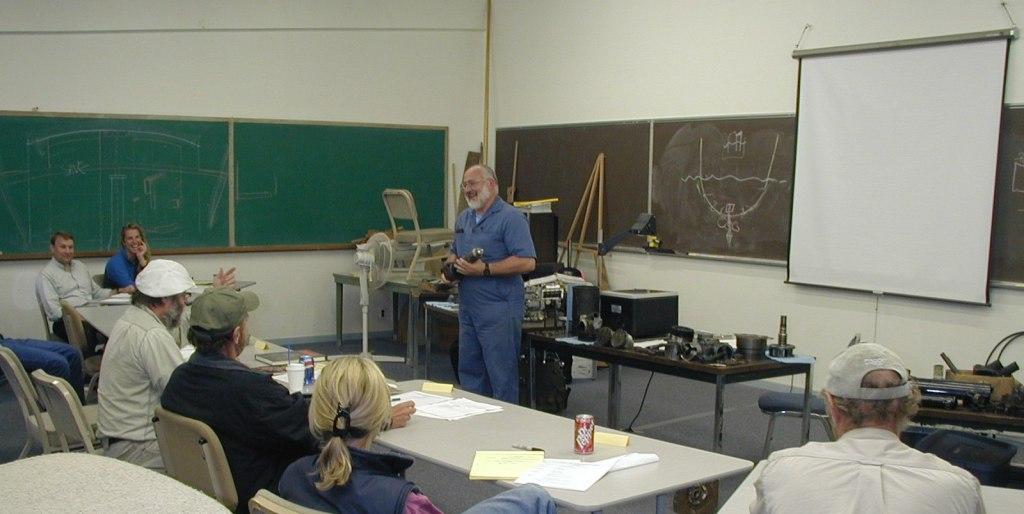
If any Related Resources should be added to this list, please submit info/links via email To: Editor♣EverythingAboutBoats.org (Replace "♣" with "@")
NOT AN ACADEMY MEMBER? CLICK HERE to discover how you can become a Member and gain FULL access to thousands of expanded pages and dozens of excellent programs including our eLibrary!
CLICK HERE to view ALL the books , magazines , videos , etc. in our Academy eLibrary. Media are also listed by category on the Topic Pages found on the Right Sidebar ⇒ CLICK HERE to donate any books, magazines, manuals, or videos, etc. to our Library.
EVERYTHING ON THIS PAGE OK? If there is anything on this webpage that needs fixing, please let us know via email To: Editor♣EverythingAboutBoats.org (Replace "♣" with "@")

Visit our FEATURED ARTICLES Home Page to see examples of our website's comprehensive contents!
Thanks to our amazing contributors for the steady flow of articles, and to our dedicated all-volunteer staff who sort, polish and format them, everyday we get a little bit closer to our goal of Everything About Boats. If you would like to submit an article, See Submitting Articles .
— TOP 20 MOST POPULAR ARTICLES —
Detroit Diesel 8.2 Liter “Fuel Pincher” V8 Engine Cummins V-555 & VT-555 “Triple-Nickel” V8 Diesel Engine Lehman 120 (6D380) Diesel Engine (Ford 2704C & 2715E) Ford Industrial Power Products Diesel Engines How to Identify Ford Diesel Engines Ford 2715E Diesel Engine Lehman Mfg. Co. Perkins Engines Universal Atomic 4 Sears Boat Motors: Motorgo, Waterwitch, Elgin, etc. Chrysler & Force Outboards Eska Outboard Motors Allison Transmission ZF Friedrichshafen AG Marine Surveyors by Country American Marine Ltd (Grand Banks) Boat Inspection (Types of Marine Surveys) Boat Builders: (A∼Z) (w/Vessel Types, Locale & Years Active) USCG NVIC 07-95 Guidance on Inspection, Repair and Maintenance of Wooden Hulls American Boat and Yacht Counsel (ABYC)
Layout of the EverythingAboutBoats.org Website's Pages
— Types of Webpages — This website consists almost entirely of 3 types of webpages as follows:
- EXAMPLE : – WEBSITE CONTENTS w/Links to MAIN TOPIC & Subtopic Pages:
- EXAMPLE : 02 – BOAT BUILDING, OUTFITTING, REFITTING & REPAIR:
- EXAMPLE : 02.06 – Boat Equipment:
- EXAMPLE : 02.06.08 – Propulsion Machinery:
- EXAMPLE : 02.06.08.01 – Engines w/Directory of Vendors .
- EXAMPLE : 02.06.08.01 – ^ Ford Industrial Power Products Diesel Engines.
- EXAMPLE : 02.06.08.01 – ^ ^ Ford 2715E Diesel Engine.
- EXAMPLE : 02.06.08.01 – ^ ^ Ford OpManual - 2710 Range Diesel Engines.
- EXAMPLE : 02.06.08.01 – ^ ^ Ford Service Manual - 2700 & 2710 Range Diesel Engines.
Clickable Links that lead to other webpages appear in Blue Text and usually open in a new window. Links in the Right Sidebar and most directories open in the current window, not a new window. Note in the examples above that these pages form a natural hierarchy. The unnumbered "^" pages are listed alphabetically in most tables. Media Titles in tables are distinguished by their smaller font size. Media ( Books , Magazines , Videos , Articles ,+) are treated as Products. Vendors' Product Documentation ( pDoc ) are considered Media . Destinations & Media Creators are treated as Vendors. All Website Pages are optimized for viewing on full-width disktop computer monitors, but can be viewed on phones.
— Contents of Webpages — Website Pages typically contain the following Sections:
- EXAMPLE : PATH: HOME , WEBSITE INDEX , WEBSITE CONTENTS » ∨ ∧ BOAT BUILDING & REPAIR » Boat Equipment » Propulsion » Engines » ∨∨ ∧∧ Ford , Ebro , American Diesel , AmMarine , Barr , Beta , Bomac , Bowman , Couach , Lees , Lehman , Mermaid , Parsons , Renault , Sabre , Thornycroft , Wortham Blake » ∧ DO-IT-YOURSELF » DIY Boat Building & Repair » DIY Schools & Classes » ∧ MEDIA w/Creator Directory » Documentation , Books , Magazines , Videos , Websites »
- ( The "»" right pointing Guillemet symbol shows the chain through the page links. )
- ( The "," comma between page links in the chain indicates pages are not subordinate, but are instead at the same level. See engine brands in the example above. )
- ( The "∨", "∨∨", "∨∨∨",+ symbols indicate that the path line continues with whatever follows the "∧", "∧∧", "∧∧∧",+ symbols respectively. "∧" Precedes each MAIN TOPIC Page. )
- PAGE CONTENTS ( Table of Contents with links to each main section on the page ).
- ( Many Topic Pages contain Directories of Vendors with Links ).
- ( Most Directory Listings are Alphabetical and/or by Locale ).
- ( Manufacturers, Resellers, Refitters, Yards, Surveyors, Clubs, Schools, Authors ,+ ).
- ( Boating & Travel Destinations are treated as Vendors on their own Vendor Pages ).
- ( Media created by a vendor is often treated as a Product on its own Product Page ).
- ( Boating & Travel Events are often treated as Products on their own Product Pages ).
- RELATED RESOURCES (Topics, Vendors, Products, Media: Books, Websites ,+ with Links ).
- The Anchors Aweigh Academy's EverythingAboutBoats.org Header.
- A link to our Featured Articles EAB Home Page.
- Top 20 Most Popular Articles. ( The section that appears right above ⇑ this section ) .
- Layout of the EverythingAboutBoats.org Website's Pages. ( This very section ⇐ ) .
- Topics of Webpages. ( The very next section below ⇓ ) .
- What we have accomplished so far.
- Members must Sign-In to gain full access to Expanded Pages & Programs.
- Sign-Up ( if not already a member ).
- Public Comments (about the website & about this page) .
- RIGHT SIDEBAR ( Website Contents menu with links to Main Topic & Subtopic pages ). ( On some smart phones, the Right Sidebar may appear at the bottom of the webpage )
— Topics of Webpages — Website Pages are categorized under the following 16 MAIN TOPICS:
The MAIN TOPICS follow a natural progression from conception of the vessel thru its building, marketing, survey, financing, insuring, transport, moorage, use and upkeep. The MAIN TOPICS (all Caps) below are followed by their Main Subtopics with Links.
00 – HOME: CONTENTS , ABOUT EAB : Contact EAB , Abbreviations & Symbols , FAQ , GLOSSARY , ADs ,+ . 01 – ABOUT BOATS w/Museum Directory : Early History , Recent History , Modern Vessel Types ,+ . 02 – BOAT BUILDING, OUTFITTING, REFITTING & REPAIR: Materials , Equipment , Builders ,+ . 03 – BOAT MARKETING: Boat Shows , Dealers & Brokers , Importing & Exporting , Auctions & Sales ,+ . 04 – BOAT INSPECTION: Types of Marine Surveys , Marine Surveyors , Schools , DIY Inspections ,+ . 05 – BOAT TITLES & VESSEL REGISTRY: Boat Title & Registration , Vessel Registry , Title Co's ,+ . 06 – BOAT FINANCING: Conventional ( Banks , Credit Unions ,+), Unconventional (Creative) ,+ . 07 – BOAT INSURANCE: Maritime & Recreational: Coverage, Carriers, Agents,+. , Claim Processing ,+ . 08 – BOAT TRANSPORT: By Sea ( Piggyback , Delivery Skippers & Crews , & Towing ), Over-Land ,+ . 09 – BOAT HAULING & LAUNCHING: Drydocks, Ways, Lifts, Cranes & Hoists , Launch Ramps ,+ . 10 – BOAT MOORAGE & STORAGE: Builders , Anchorages , Marinas , Yards, Racks & Stacks ,+ . 11 – BOATING ORGANIZATIONS: Yacht Clubs & Sailing Clubs , Paddling Clubs , Boat Owners ,+ . 12 – BOATING & TRAVEL: Events , Destinations , Boat Rentals & Charters , Cruises , Voyages ,+ . 13 – BOATING & MARITIME EDUCATION: Recreational Seamanship , Ship's Master & Crew ,+ . 14 – MARINE LAWS & REGULATIONS : International & National Laws ‚ Lawyers ‚ Investigators ‚+ . 15 – DO-IT-YOURSELF: DIY Boat Building & Repair , DIY Boat Sales , DIY Boat Surveys , DIY Classes ,+ . 16 – MEDIA w/Creator Directory + Academy eLibrary : pDocs , Books , Magazines , Videos , Websites ,+ .
The above MAIN TOPICS and a more detailed listing of Subtopics can be found on the Website Contents page and on the Right Sidebar .
What we have accomplished so far . Anchors Aweigh Academy and its EverythingAboutBoats.org website.
- Published over 50,000 website pages about boats and boating, bringing us closer to reaching our goal of becoming "The ultimate reference resource about boats and ships for everyone from the beginning recreational boater to the seasoned professional mariner!"
- Published over 300 website main topic webpages, many with full articles on the topic. See our Website Contents or the Right Sidebar for the listing of the main topic pages.
- Published over 9,000 marine vendor webpages, all with their contact information, most with a description of their products and services, many with product documentation, specifications and independent reviews. (incl.: Boat designers, boat building tools, material and equipment manufacturers and suppliers, boat builders and dealers, yacht brokers, marine surveyors, boat insurers, boat transporters, skippers and crews, boatyards and marinas, yacht clubs, boat rentals and yacht charters, boating, seamanship and maritime schools, marine law attorneys and expert witnesses, boat refitters and repairers, book authors, magazine publishers, video producers, and website creators)
- Acquired over 120,000 pages of product documentation including Catalogs, Brochures, SpecSheets, Pictures, Serial Number Guides, Installation Manuals, OpManuals, Parts Catalogs, Parts Bulletins, Shop Manuals, Wiring Diagrams, Service Bulletins, and Recalls. And have made all viewable to Academy Members through our EAB website eLibrary .
- Acquired over 1,200 books and magazine back issues in our academy library and so far have made over 700 viewable to Academy Members through our EAB website eLibrary .
- Published over 500 DIY How-To articles about boat design, construction, inspection, operation, maintenance, troubleshooting and repair. We are working hard to do more.
We are currently formatting and polishing the Anchors Aweigh Academy online and hands-on courses. Our Marine Surveying course has proven to be excellent for both the beginner and the seasoned surveyor, and especially helpful to the Do-It-Yourselfer.
Current Academy Members must SIGN IN to gain FULL access to this website including expanded pages and valuable Academy programs like our Academy eLibrary and our Ask-An-Expert Program! If your membership has expired, CLICK HERE to Renew .
IF YOU ARE NOT YET AN ANCHORS AWEIGH ACADEMY MEMBER, CLICK HERE to discover how you can become a Member and gain FULL access to thousands of expanded pages and articles, and dozens of excellent programs WITH JUST A SMALL DONATION!
Comments for Public Viewing
Submit any comments for public viewing via email To: Comments♣EverthingAboutBoats.org ( Replace "♣" with "@" ) Please remember to put this webpage's title in the subject line of your email. All comments are moderated before they appear on this page. See Comment Rules .
General Comments About the Website
FROM Donald: " This is an awesome website. I found the information that I needed right away from one of the over 20,000 free articles that you provide as a public service. I'm surprised that so much if this site is free. But I still signed up so I could access the thousands of expanded pages, interesting articles, and dozens of valuable programs! The member's library of books, magazines and videos that I can view online is really terrific! I understand that you and your staff are all unpaid volunteers. Please keep up the good work. And I commend you for your plans to add another 10,000 free informative articles over the next year. I'm thrilled to support you in this endeavor with my small membership donation. Thanks again for all your hard work. "
FROM Huey: " I agree with my Uncle, I too have found the articles to be very enlightening. They say that it will take about 100,000 articles to cover the full scope that they have envisioned for the website. They have over 20,000 articles so far and that's doing pretty well, but it could take several years to get the rest. I also noticed that many of the Main Topic Pages and some of the article pages are still in the rough draft stage. I guess that they will fill in as they can get volunteers to work on them. But what I can't figure out is why anyone would spend the time writing informative in depth articles just to give away free to this website for publication? What's in it for them? "
FROM Dewey: " Well Huey, to me It looks like most of the articles on this website are written by very informed people, like boating instructors, boat designers, boat builders, riggers, electricians, fitters, marine repair technicians and marine surveyors. Writing such articles helps establish them as knowledgeable professionals. After all, this website was originally created by a school for marine technicians and marine surveyors. The website is growing in content every day. They even had to move to a bigger, more powerful server because the website's traffic has been growing exponentially. "
FROM Louie: " I agree with everyone above. This site is quickly becoming the ultimate reference resource about every aspect of boats and ships for everyone from the beginning recreational boater to the seasoned professional mariner. I use the topic pages on the right sidebar to browse around the website. It's like a Junior Woodchucks' Guidebook for Boaters. Their Members' Library of over 300 popular and obscure books and over 200 magazine back issues that can be viewed online is fabulous. The Academy's magazine is especially informative. On top of that, there is the "Ask-An-Expert program for members where you can get an expert's answer to any of your boat questions. And a whole years membership is only $25. What a deal! I really love being part of this "Everything About Boats" community and help provide thousands of helpful articles free to the public. I think that I'll sit down right now and write an article about my experiences boating with my uncle. "
FROM Scrooge: " You rave about this website like it was the best thing since sliced bread. Well, I think it stinks. Sure, it has a lot of good information for boaters, and they're adding more every day, but it will probably never be finished. Furthermore, I don't even own a boat. And I wouldn't have a boat even if someone gave me one. Boats are a waste of money and time and energy and money! They're just a hole in the water you pour money into. If you gave me a boat, I'd sell it quicker then you could say Baggywrinkle. Then I'd lock up the cash with all my other money so I could keep my eye on it and count it every day. Bah humbug. "
FROM Daisy: " I'm just so glad that Donald got the boat so we and the boys could enjoy boating — together. And of course all of the girls, April, May, and June, love to be on the water too, especially when that is where the boys are. Oh poor Scrooge, boating is more fun then you could possibly imagine. "
FROM Scrooge: " After seeing how much fun you all have on the water together, I regret that I didn't have that much fun when I was young. I've had a change of heart, and I'm giving each of you a Lifetime Academy Membership . "
FROM Editor: " For those of you that have stayed with us this far, many thanks, and we hope that you found this little narrative informative. Your faithful support inspires us to keep working on this phenomenal website. We know that we have a lot more to do. Ultimately, we hope that we can help you enjoy the wonder filled world of boating as much as we do. We are all waiting to see what you have to say about this webpage article. Submit any comments via email To: Comments♣EverythingAboutBoats.org (Replace "♣" with "@"). Be sure to include this page's title in the subject line. Also, your corrections, updates, additions and suggestions are welcomed. Please submit them via email To: Editor♣EverythingAboutBoats.org (Replace "♣" with "@"). It has been truly amazing to see what we have been able to accomplished when we've worked together. Thanks to all those that have donated their valuable time and energy, and a special THANK YOU to all that have supported this cause with their membership donations. "
Comments About This Particular Page
FROM ΞNameΞ: " Be_the_next_to_comment_about_this_page. " {230316}

- Standards Library
- Standards Development
- Technical Toolkit
- Become a Member
- Member Benefits
- Member Toolkit
- Member Directory
- Online Learning
Certification Program
- Curriculum for Educators
- School Accreditation
- Events Calendar
- Rent Our Venue
- Scholarships
- Workforce Development
- Technical Board
- Media Resources
- 01 Online Learning
- 02 Certification Program
- 03 Curriculum for Educators
- 04 School Accreditation
ABYC Certification: A Benchmark in Marine Technical Education
When customers search for top-notch marine technicians, ABYC Certification stands out. Our nationally accredited program hones the skills of individual technicians and elevates the standard of businesses. Ensure your team remains updated and equipped to offer the best services.
ABYC Certification Highlights
- Nationally Accredited Program: Recognized as the benchmark in marine technical education.
- Broad Spectrum of Expertise: Certifications in Marine Systems, Marine Electrical, Diesel Engines, Advanced Marine Electrical, and more.
- Master Technician Credential: For those seeking the pinnacle of marine service excellence.
Join over 4,500 marine technicians who have stamped their commitment to safety with ABYC’s Certification.
For Businesses: Commit to Excellence
In the marine industry, the strength of your business is often measured by the skills of your technicians. Solidify your position as a trusted leader in boat service and repair.
- Demonstrated Commitment to Industry Standards
- Enhanced Credibility
- Strengthen Team Skills
- Increase Customer Loyalty
For Individuals: Your Journey to Marine Mastery
Stand Out with ABYC Certification. With ABYC, you’re not just getting a certification—you’re making a statement of dedication, quality, and trust in the marine world.
- Distinguish Yourself
- Continuous Learning
- Gain Industry Credibility
- Boost Your Career
Professional Certifications Include:
Marine standards, marine systems, marine corrosion, marine electrical, marine composites, a/c refrigeration, advanced marine electrical, fuel systems, service management.
coming soon!

How to become ABYC Certified
Classes are taught by industry professionals/ABYC Certified Technicians and held around the world and online. ABYC Certifications are verified by the third party NOCTI Business Solutions, ensuring relevance and value. Exams are all multiple-choice questions measuring your knowledge in different areas. Upon passing, certifications are active for 5 years.
How to Earn a Professional Certification
- Take a Certification course – View calendar
- Self-study and test with a proctor – Learn more here
Recertification
To maintain your ABYC Professional Certification you must take the shorter recertification exam and fulfill a CEU requirement. Recertification is a simple process that re-establishes your educational standing in the industry.
On-site Courses
ABYC Business members can choose to host its own in-person or virtual class. Businesses can host the location and fill the course with their own attendees for a set price to ABYC, which includes the study guides, exams and a dedicated instructor.
Certification Designations
ABYC recognizes that many different types of marine industry professionals desire ABYC professional certifications, however not all of those individuals are physically working on boats. Many are in an advisory or consulting position and have a need for the same type of knowledge, but lack the practical skills that are necessary by service and installation technicians. ABYC has created certification designations to better associate the type of work being done by the individual.
Advisor Certification
Designed for people who work within the marine service sector that desire an ABYC certification but do not physically work on boats performing repairs.
Examples: Marine surveyors, customer service representatives and engineering standards compliance specialists.
- Requirements for initial certification: Passing score on certification exam
- Requirements for re-certification: Passing score on re-certification exam + 10 CEUs
- Certifications are valid for 5 years
Technician Certification
Technician certification is the means by which the ABYC and the general public identify those that are actually certified to perform trouble-shooting, repairs and equipment installations on boats.
Examples: Technicians, installers.
- Requirements for initial certification: Passing score on certification exam + 2 years of work experience.
NOCTI Collaboration: Third-Party Validation
Our collaboration with NOCTI underscores the authenticity and rigor of the ABYC Professional Certification Program. Renowned for its commitment to high-quality assessment and validation services, NOCTI’s third-party validation provides an added layer of credibility to our certifications, emphasizing the program’s alignment with the highest industry benchmarks.
Schedule Your Next Class
Become an ABYC Member
Tap into the essential source of technical information.
Take the First Step Toward Your Mechanic Career Now!
Marine Mechanic Schools in or near Washington
Washington marine maintenance schools.
Find a Washington trade school with excellent marine maintenance training programs near you. Take college classes and learn to run diagnostics on watercraft, test and inspect boat parts, and repair any problems that may exist. Use the marine mechanic search application and find a college with marine mechanic courses in Washington.
Read: Become a Marine Mechanic - What does a marine mechanic do?
Select your Program
Select a city to find schools nearby, marine maintenance schools in or near washington.

9428 Old Pacific Highway
Woodland, WA 98674
Other Programs In Your Area
- Cosmetology
- Medical Assistant
- Criminal Justice
- Request Information
- Support Students

- Visiting Campus
- Comprehensive Career Boat Building
- Marine Service Technology
- Career Technical Education – Small Engine Program
- Financial Aid
- For Students
- For Employers & Industry
- Disclosures

- Admissions & Aid
- Newsletter Signup
- Boats For Sale
- Captain’s Corner
- Like us on Facebook
- Follow Us on Instagram
- Make a Donation
- Boats for Sale
- Summer Workshops
- Blog & Social Media
Have a Question?
- Send an Email
- Give us a Call
Request an Information Packet

Program Objective
The Marine Service Technology (MST) Program is designed to prepare individuals who are well-rounded, entry-level marine technicians. Marine technicians work in settings such as marinas, marine dealerships, boat repair yards, marine manufacturing facilities, and yacht clubs. They perform installation and maintenance services on recreational and light commercial boats.
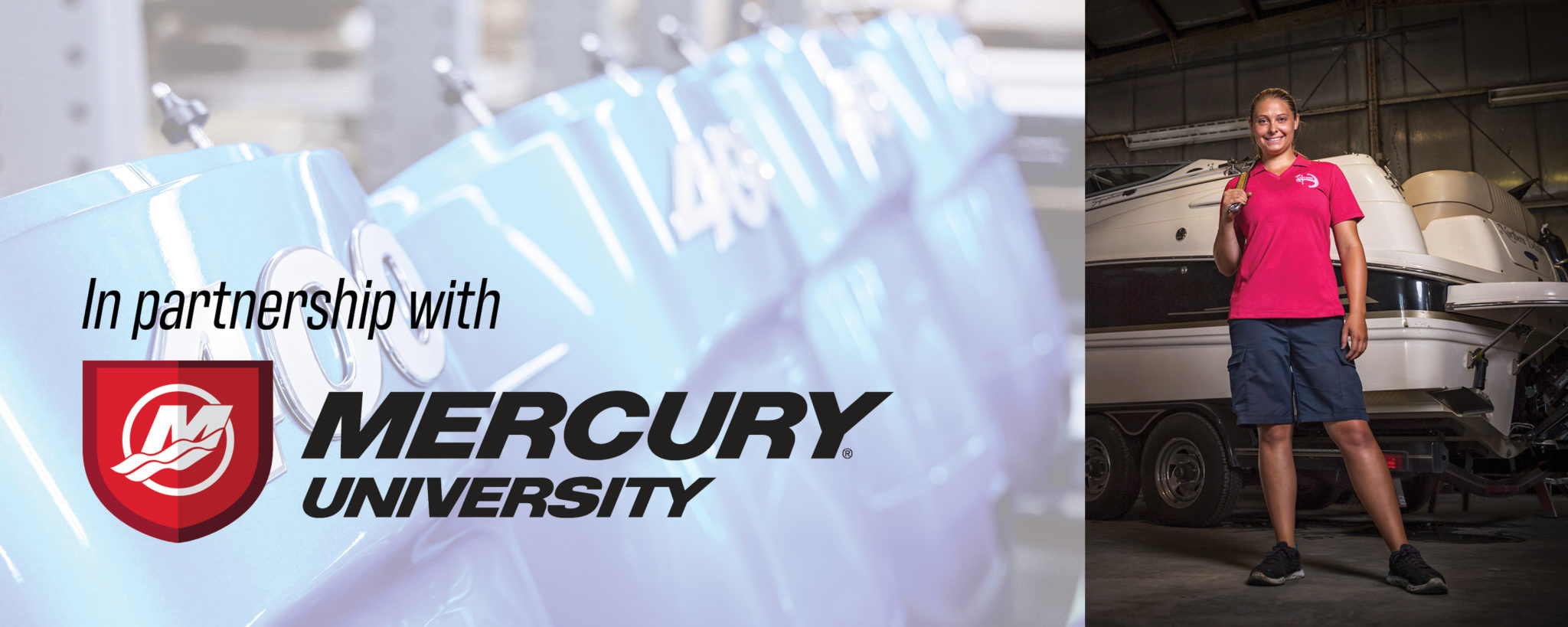
Program Description
The Marine Service Technology program requires 42 credits of coursework, including instruction in the classroom and in the shop, hands-on application in supervised lab time in the shop, and team and individual projects in the shop. The program is completed in three 15-week semesters in a 12-month period. Students complete a total of 1470 clock hours in instructional settings and outside preparation for instruction and projects over the course of the program. At the completion of the program, students will receive a certificate and will be eligible to test for ABYC certifications. The typical number of students in classroom or laboratory/shop settings of instruction is 15.

Enter The Workforce After 12 Months
Marine technicians (also known as marine mechanics) are experts in the maintenance and repair of the systems that keep the boats running. Rather than sitting at a desk all day, these technicians are constantly on their feet performing installation and maintenance services and working on new projects. From old fishing boats to a new shiny yacht, it is a marine technician’s job to make sure the boat operates properly.
Becoming a Marine Technician

Typical Work Environments Include:
- Boat dealerships
- Independent repair shops
- Outdoor department stores
- Yacht centers
- Cruise lines
- U.S. Navy and Marine Corps
Marine Technician Duties:
- Performing routine maintenance
- Keeping customers in the loop by communicating what needs to be done to get their boat up and running properly
- Observing and testing equipment on the boat
- Replacing and repairing worn, damaged, and defective pieces and parts
- Documenting repairs for the client
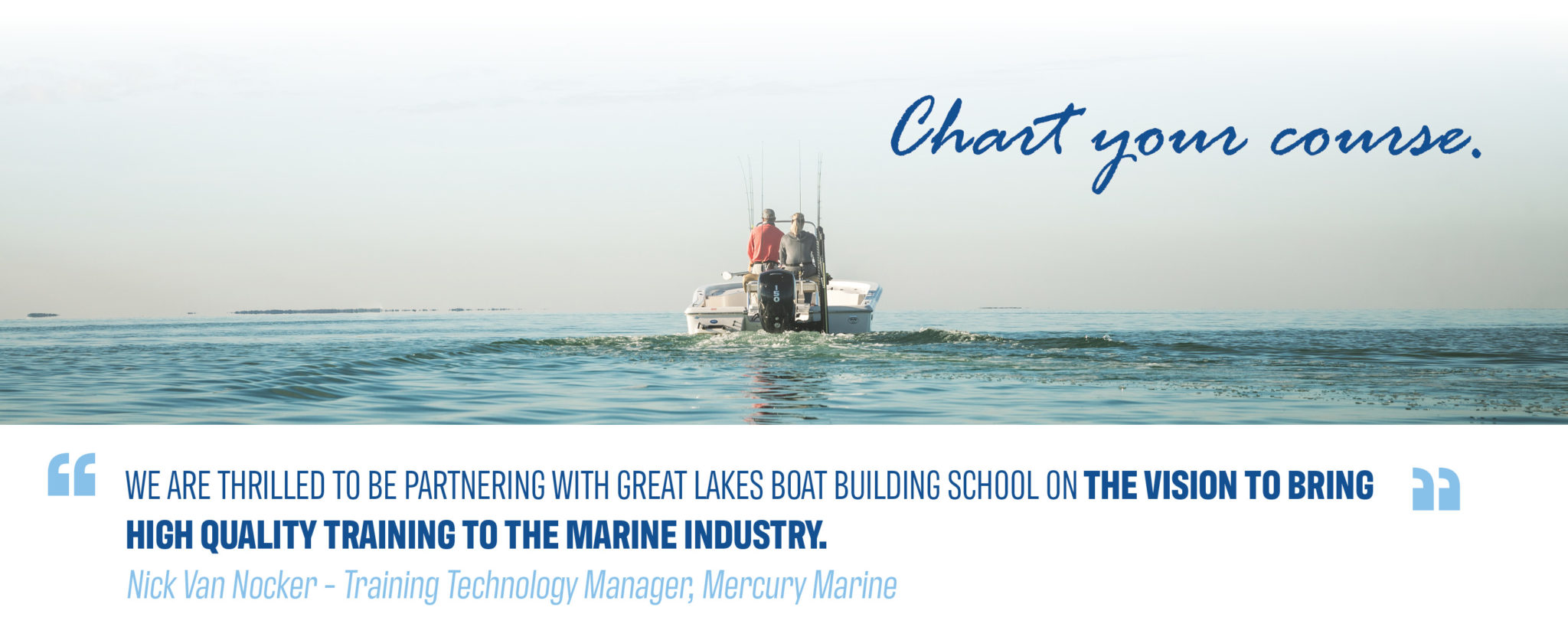
visit our school today
- Interested in a career in the marine trades industry? Please use this form to request information regarding our 12-month marine trades programs.
- First Name *
- Last Name *
- Hidden ST Alabama Alaska Arizona Arkansas California Colorado Connecticut Delaware District of Columbia Florida Georgia Hawaii Idaho Illinois Indiana Iowa Kansas Kentucky Louisiana Maine Maryland Massachusetts Michigan Minnesota Mississippi Missouri Montana Nebraska Nevada New Hampshire New Jersey New Mexico New York North Carolina North Dakota Ohio Oklahoma Oregon Pennsylvania Rhode Island South Carolina South Dakota Tennessee Texas Utah Vermont Virginia Washington West Virginia Wisconsin Wyoming Armed Forces Americas Armed Forces Europe Armed Forces Pacific
- What programs are you interested in? * Comprehensive Career Boat Building Marine Service Technology Both
- What year are you interested in starting at GLBBS? * 2024 2025 2026 undecided
Disclosure: By submitting this form, I agree that Great Lakes Boat Building School may call, text, and/or email me about their educational services at the contact information provided. I may unsubscribe at any time.
- Phone This field is for validation purposes and should be left unchanged.
Introduction to Marine Service Technology
Coursework in the first semester provides students with an introduction to the Marine Services Technology field, and basic skills and knowledge necessary for working with boats and in marine-related settings.
Credit hours: 14 Course completion: 15 Weeks

Marine Propulsion
In the second semester, students apply and further develop their knowledge and skills related to boatyard operations, and focus on the fundamentals of the wide range of propulsion and drive systems that are used in boats.
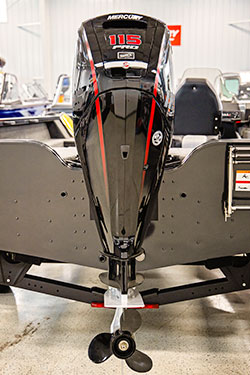
Marine Systems
The third semester coursework extends consideration of marine systems to non-engine systems including electrical, plumbing and climate control. Boatyard operations are also emphasized, as students apply knowledge and skills to the processes of winterizing and commissioning boats.
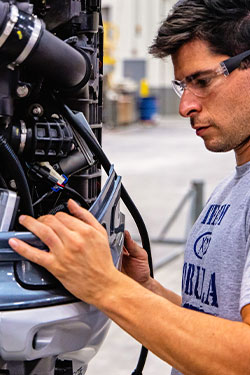
(906) 484-1081 485 South Meridian Road Cedarville, MI 49719
© 2019 Great Lakes Boat Building School. All Rights Reserved. | Privacy Policy Website by Central States Media
- Purchase GLBBS Apparel
Important Registration Information - 2024 Registration
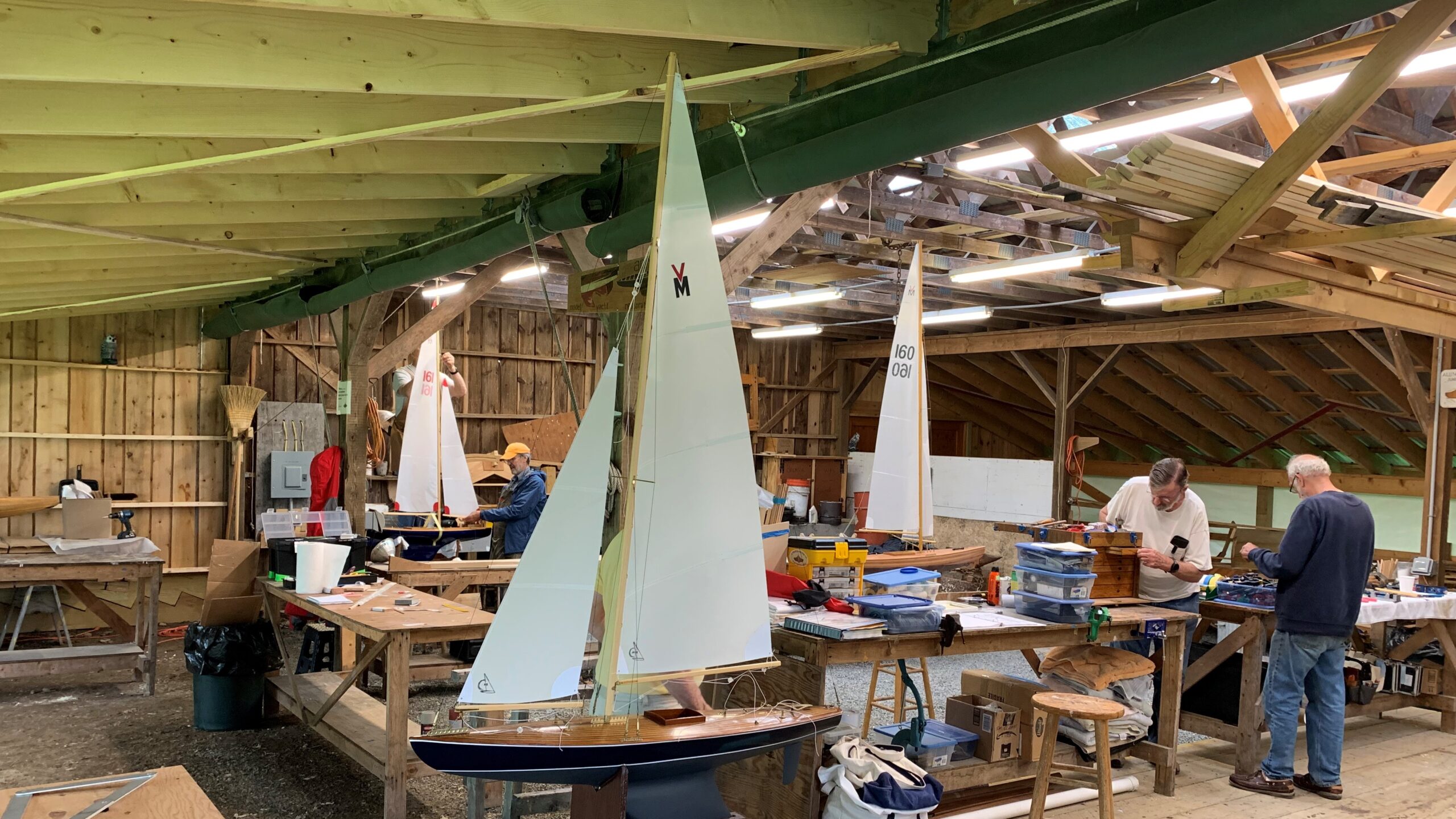
Pond Yacht Restoration
Restore/complete your own pond yacht and get it ready for sailing or display..
John Stoudt was an industrial arts teacher focusing on woodworking, metalworking, and architectural and engineering drawing. He honed his skills and further developed his expertise here at WoodenBoat School. John took his first class with Alan Suydam, returning many years to build and sail model yachts. He has built and restored over 100 model boats, including many vintage model yachts. His skill set enables him to build a complete boat including hull construction, custom fittings, casting ballasts, making the sails, and tuning the rig for sailing. John is president of the United States Vintage Model Yacht Group (USVMYG) and an associate regional director of the American Model Yacht Association. He collects model yachts and currently has over 60 boats in his collection. John races various pond yachts in Maryland, New Jersey, and Pennsylvania and has participated in National events, placing in the top three on multiple occasions in the vintage Marblehead class USVMYG National Championship regatta with his 1934 vintage Marblehead.
This course is appropriate for students with some knowledge and experience. Basic knowledge and use of hand tools is required for most shop courses. Basic knowledge and ability to sail is required for most waterfront courses.
This course involves a low level of activity throughout the week including: occasional standing and working, seating is usually available, working on your own project at your own pace is common.
This is a six-day course ending Saturday
There are various models and pond yachts out in the world in need of repair or restoration. The boat may have been a family heirloom, a model you found in an antique shop or at a flea market, or a project that you began but couldn’t find time to complete. If you happen to have such a boat, this week with John Stoudt will present you with the opportunity to evaluate your model and determine a plan for its restoration and completion. The work might include repairing a damaged hull, building a new rig, making fittings, repairing a vane gear, getting the electronics working, installing new electronics, or re-rigging the boat. An unfinished boat could have a planked deck built and installed, hatch openings framed, hatches built and fitted, spars constructed, electronics installed and set up, or the rig built and installed. A display and travel stand could also be built. And there may even be the chance to establish a waterline and paint the model to your specifications.
Students may bring any type of pond yacht, especially those rigged for remote control. Some older self-steering boats could be reconfigured for remote control sailing or the self-steering mechanism could be repaired. If you have any questions about the boat or model you have, you can contact the instructor through the WoodenBoat School office.
John Stoudt will consult with each student prior to the course to develop an understanding of your boat and plan of work. Together you will determine what materials and supplies you will need to bring along and what John will make available. He will have other materials and parts on hand for the unexpected. A final plan for the restoration and/or completion of your boat will be established on the first day of class. Each morning, the students and John will evaluate where they are, how they have progressed, and how to proceed. Come spend a week at WoodenBoat School and develop a passion for models that is both fun and rewarding!
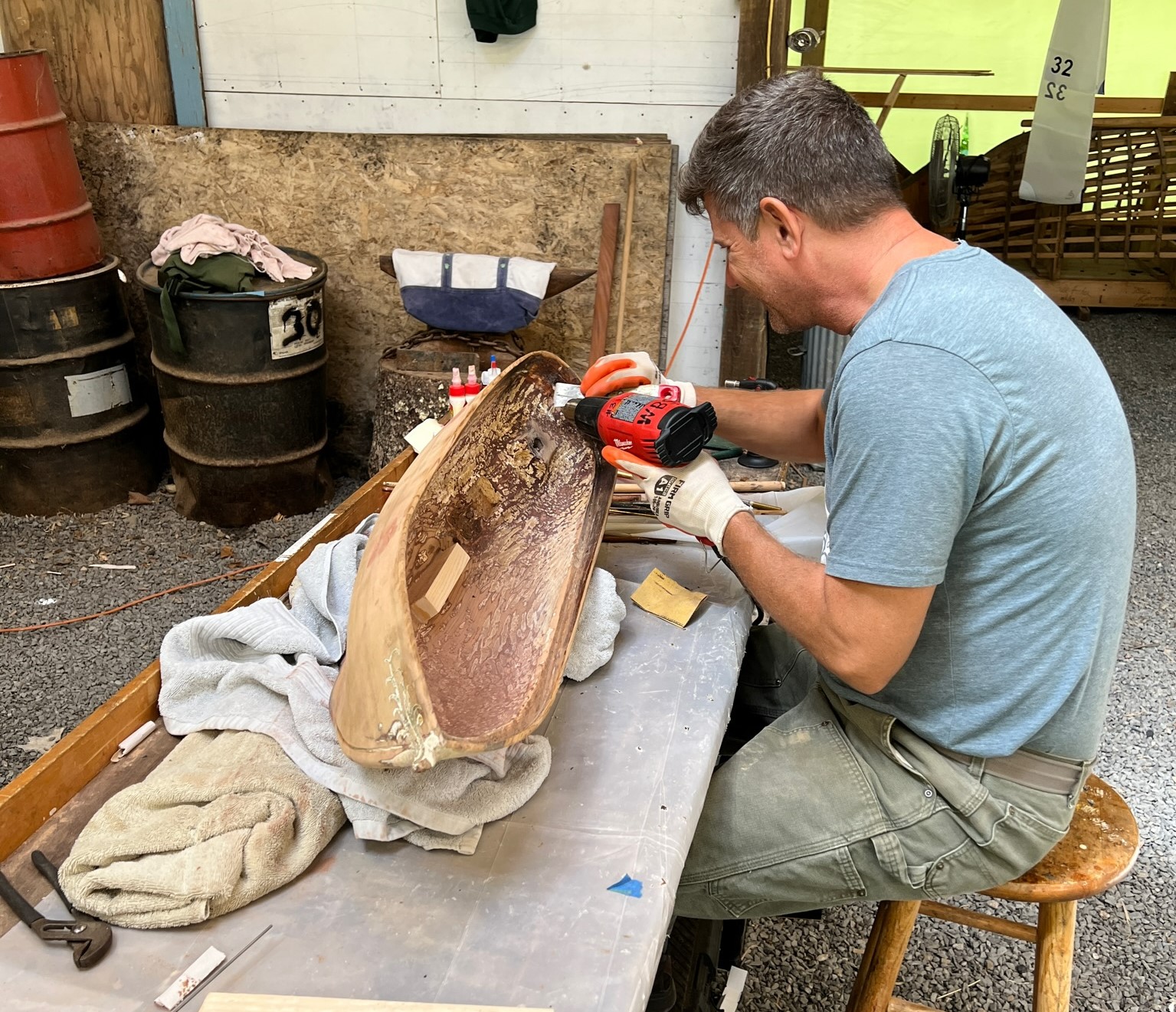
This course is appropriate for students with some knowledge and experience. Basic knowledge and use of hand tools is required for most shop courses.
What Our Students Are Saying
John Stoudt is absolutely one of the best instructors I’ve had here at your school. Very knowledgeable and willing to share his expertise with all his students. POND YACHT RESTORATION was exactly what I wanted and needed. I would definitely take this course again!
T.B., Kenosha, Wisconsin

Register For This Course
Courses fill quickly, so don't delay if this is a course you want to take.
Related Courses
Woodcarving, carving name boards, build your own plank constructed pond yacht, introduction to woodworking.
- Hispanoamérica
- Work at ArchDaily
- Terms of Use
- Privacy Policy
- Cookie Policy
Letovo Schoolcampus / atelier PRO

- Curated by Fernanda Castro
- Architects: atelier PRO
- Area Area of this architecture project Area: 39000 m²
- Year Completion year of this architecture project Year: 2018
- Photographs Photographs: NARODIZKIY , Dmitry Voinov , atelier PRO
- Interior Design : Atelier PRO , Thijs Klinkhamer
- Landscape Designer : Buro Sant en Co
- Client: Letovo
- Project Architects: Dorte Kristensen, Pascale Leistra, Karho Yeung
- Design Team: Thijs Klinkhamer, Abel de Raadt, Alessia Topolnyk
- Russian Co Architect: Atrium, Moscow
- City: Moscow
- Country: Russia
- Did you collaborate on this project?

Text description provided by the architects. The official grand opening of a special school, Letovo School , took place in Moscow last September. The assignment entailed a 20 hectare schoolcampus with educational facilities, student housing and school staff housing. The school campus offers extended outdoor sports facilities with a soccer stade, a running track, tennis courts and basketball courts. In addition there is a greenhouse, a treeyard and ample space for wandering and relaxation in the green.

While the architecture and interior of the school were designed by atelier PRO, the landscape design was developed by Buro Sant en Co landscape architecture. Russian firm Atrium Architectural Studio was responsible for the technical execution. In 2014 Atelier PRO had won the international design competition, the construction began mid-2016 and the campus was taken into use by mid-2018.

Letovo, a dream come true Letovo School is a special school for gifted and motivated children aged 12 to 17. The idea to create the school came from entrepreneur and philanthropist Vadim Moshkovich: ‘My dream was to offer talented children from all over the country access to high-quality education, regardless of their parents’ financial means. This school makes it possible for them to continue their studies at the 10 best universities in the country or at one of the top 50 universities in the world.’

Landscape-inspired design and shape Located in Novaya Moskva,southwest of Moscow ,the campus sits atop a beautiful plot of land that slopes down to a forest-lined river. Distinctive level variations were applied in and around the school to integrate the architecture into the landscape.

The shape of the large complex brings it down to a human scale for the children: the building appears to dance across the landscape due to its dynamic design. Due to the perspective effect one only ever sees part of the building's full size when walking around, which gives the impression of a refined scale. The building’s contours and flowing curves create surprising indoor and outdoor spaces as well.

The heart of the school: the central hub The central hub is the place where day-to-day life at the school unfolds. This flexible, transformable space will be used throughout the day as an informal meeting place. The dance studio on the ground floor can be transformed through a few simple adjustments into a theatre with a stage, a cosy living room or an auditorium that can accommodate 1,000 people for special events such as graduation ceremonies and large celebrations, as seen at the grand opening. This central hub connects the building’s three wings: the art wing, the south wing with science- and general-use rooms and the sports wing

Learning environment with a diversity in working spaces Letovo envisioned an innovative and modern take on existing education in Russia. In the spatial design, this perspective translates into space for theoretical education as well as special areas for group work and independent study in the tapered building wings. In the library wing there are silence spaces workshop spaces and a debating room. These are all supportive to the student’s personal development.

Sports programme In addition to the extended sports outdoor facilities, the indoor supply of sports facilities is substantial. These cover fitness rooms, martial arts rooms, a swimming pool, a small and a large sports hall. Around the sports hall there’s an indoor running track which can be used throughout the year. It is available to school staff and external users as well.

The interior, also designed by atelier PRO, is tailored to the aims of the ambitious programme. The design of the interior also focuses extensively on the various spaces where students can go to chill and meet up with friends. The extreme cold in this area makes the school’s indoor atmosphere important for relaxation.

Ambitous learning environment The Russian client has established a private, non-profit school which aims to be the most prestigious school in the country and to offer the best educational programme through a Russion and an IB (International Baccalaureate) curriculum. Students’ personal development is paramount, with the school adopting a holistic approach. It is a true learning environment that provides scope for a range of disciplines, areas of interest and recreational opportunities to foster children’s development. This aim is supported by the campus facilities and functions.

Project gallery

Project location
Address: zimenkovskaya street, sosenskoye settlement, moscow, russia.

Materials and Tags
- Sustainability
世界上最受欢迎的建筑网站现已推出你的母语版本!
想浏览archdaily中国吗, you've started following your first account, did you know.
You'll now receive updates based on what you follow! Personalize your stream and start following your favorite authors, offices and users.
Check the latest Desks
Check the latest Desk Accessories
THE 10 BEST Moscow Boat Rides & Cruises
Boat rides & cruises in moscow.
- Boat Rentals
- Scuba & Snorkeling
- Fishing Charters & Tours
- Water Sports
- Stand-Up Paddleboarding
- Surfing, Windsurfing & Kitesurfing
- Kayaking & Canoeing
- Waterskiing & Jetskiing
- Parasailing & Paragliding
- River Rafting & Tubing
- Dolphin & Whale Watching
- Speed Boats Tours
- Submarine Tours
- 5.0 of 5 bubbles
- 4.0 of 5 bubbles & up
- 3.0 of 5 bubbles & up
- 2.0 of 5 bubbles & up
- 3rd Transport Ring (TTK)
- District Central (TsAO)
- Garden Ring
- District Northern (SAO)
- Good for Big Groups
- Good for Couples
- Good for a Rainy Day
- Budget-friendly
- Good for Kids
- Hidden Gems
- Honeymoon spot
- Good for Adrenaline Seekers
- Adventurous
- Things to do ranked using Tripadvisor data including reviews, ratings, photos, and popularity.

1. Flotilla Radisson Royal

2. Moscow River Boat Tours

3. Sup-Club
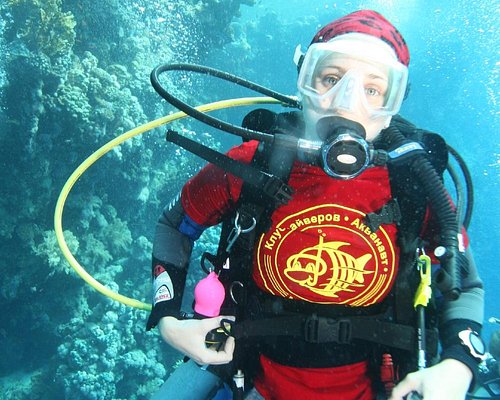
4. Akvanavt Diving Centre
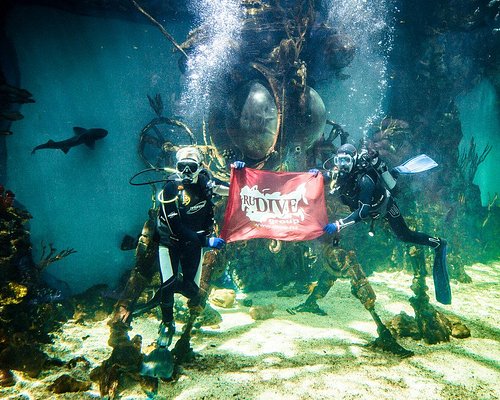
5. Diving Center Crocus City Oceanarium
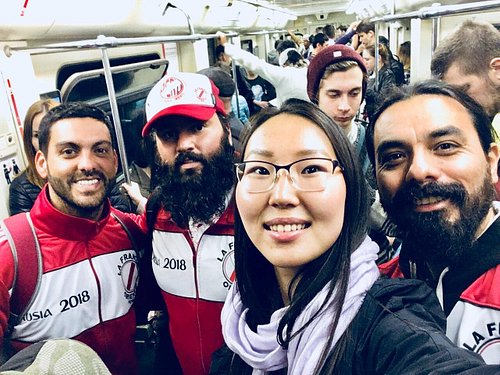
6. CheapRussia Tours
7. Kite School Kiteclass

8. SUP Center
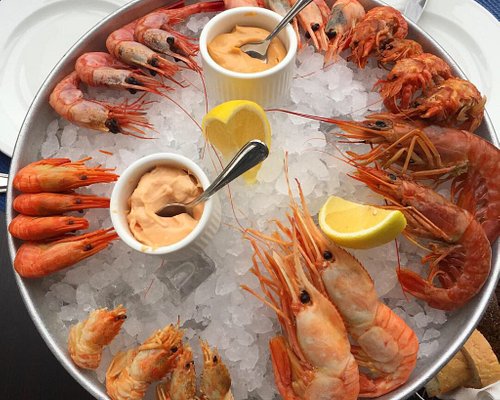
9. Erwin. Reka
11. Easy Russia Tour Guide
12. Lovely Russia Tours

13. Capital River Boat Tours - Moscow Centre

14. Alfa Centr
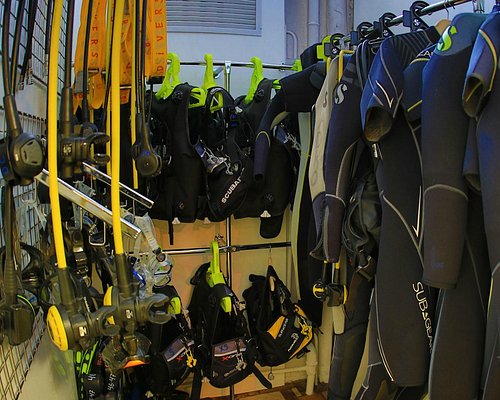
15. Diving Club Divers
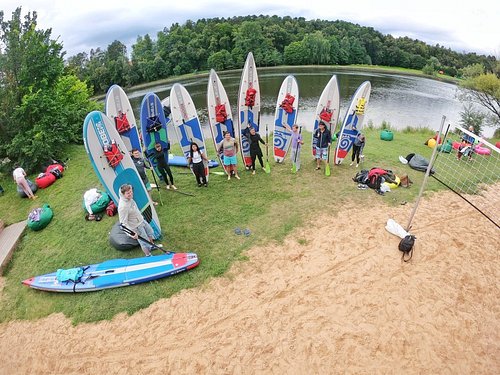
16. Sup Outdoor

17. MORE MOSCOW
19. Soho Sailing Style

20. Diving Center Crocodile

21. Dive-Project

22. Mosparokhodstvo
24. Kosinskiy Children Marine Club
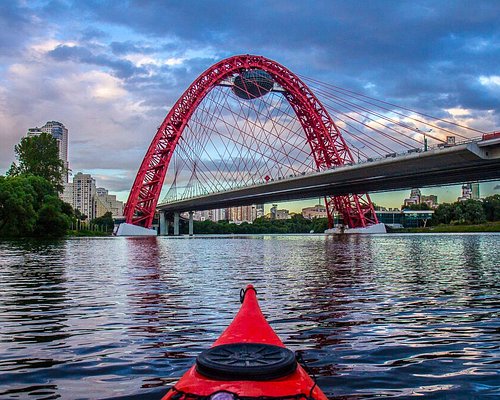
25. Kayak Moscow
26. DIVECLUB CHE

27. FLOW Moscow

28. Moswake

29. Morskiye Volki

30. S-cruises
What travelers are saying

- CheapRussia Tours
- Easy Russia Tour Guide
- Lovely Russia Tours
- MORE MOSCOW
- Insider Moscow Tours
- Flotilla Radisson Royal
- Moscow River Boat Tours
- Capital River Boat Tours - Moscow Centre
- Diving Center Crocus City Oceanarium

IMAGES
VIDEO
COMMENTS
The Marine Technician Specialist program is perfect for those who love the water and want to pursue a career in the marine industry. 1 Through a combination of classroom instruction and hands-on experience, students will learn everything from inboard gas and diesel to outboard 4-stroke and 2-stroke motors. 51-week core program 60-week program ...
According to 2021 data from the Occupational Employment and Wage Statistics program, the median marine mechanic salary was $46,730.*. Plus, employment projections from the Bureau of Labor Statistics show that, on average, about 3,000 job openings are projected to become available each year in this trade from 2021 to 2031.*.
Marine Repair Technician. 42 Credits | 1.5 Years. $7,342. $4,350 for tools, supplies and uniforms. *Tuition is an estimate and does not include any miscellaneous fees for various courses, tools, books, supplies or uniforms. Program book costs are in addition to tuition and fees and vary depending on course selection and where the books are ...
The ABBRA report breaks wages down by marine-trade job and by region. To get an idea of the nationwide figures, an unskilled yard laborer in 2009 earned $16 per hour on average, with a range of $8 to $26. Mechanics earn an average hourly wage of $22; electronics technicians, $24; yard foremen, $24.75.
9. The Landing School, Maine. The Landing School is one of the oldest marine mechanic schools in the country. It has received accreditation from The Accrediting Commission of Career Schools and Colleges (ACCSC) for its programs in yacht design, wooden boat building, composite boat building, and marine systems.
31461322. This course will teach students the theory of how a four-stroke marine engine operates. Students will gain the skills needed to rebuild inboard four-stroke marine engines. Students will also learn the fundamentals of inboard fuel, ignition, starting, and charging systems.COREQUISITE: 31461314 Outboard Motors.
The Marine League of Schools is comprised of post-secondary schools offering marine trade programs that provide ABYC standards-based educational programming. The Marine Technology program is conditionally accredited by the Marine Trades Accreditation Program , ABYC Foundation, 613 Third Street, Annapolis, MD 21146, 410-990-4460, ext. 200 ...
Welcome to Great Lakes Boat Building School... At GLBBS, our students spend around 80% of their time in the shop. Fundamental to all programs at GLBBS is a strong focus on hands-on, applied learning which is reflected through the daily schedule during the semester. Our incoming classes typically range from 8-12 students, so our students receive ...
Find accredited marine mechanic certification training programs (small engine repair) at trade schools and technical colleges near you. Find a school with specialized technology training available like: watercraft, learn to diagnose, repair and overhaul speedboat, pontoon, jet-ski, outboard motor and more. Use the search application to connect with a mechanic training program.
Enroll in our Marine Service Technologies program today. To get started with this program, sign up today to attend a program orientation by contacting the Admissions Counselor at: [email protected] or 754.321.5840. For additional information, please contact the Office of Admissions at (754) 321-5700.
2024 IYRS Summer Gala. 6:00 PM. IYRS 449 Thames Street, Newport, RI 02840. >. 3:11. IYRS School of Technology & Trades is a non-profit, trade school in Newport, RI. We teach students hands-on skills for in-demand careers.
The Marine Maintenance certificate is a seven-month program that starts in the fall semester. Classes meet twice a week, and students are encouraged to work part-time in a marine setting while completing the program. Lakes Region Community College has established partnerships with more than 30 marinas throughout New England and works closely ...
15 - DO-IT-YOURSELF: DIY Boat Building & Repair, DIY Boat Sales, DIY Boat Surveys, DIY Classes,+. 16 - MEDIA w/Creator Directory + Academy eLibrary: pDocs, Books, Magazines, Videos, Websites,+. The above MAIN TOPICS and a more detailed listing of Subtopics can be found on the Website Contents page and on the Right Sidebar.
The Advanced Marine Repair Technician certificate is designed to provide graduates of the Marine Repair Technician program with the opportunity to develop advanced-level skills in the areas of marine engine rebuilding and marine engine/power systems. Diagnostics and the repair of outboard motors, inboard engines, marine transmissions, along ...
ABYC Certification: A Benchmark in Marine Technical Education. When customers search for top-notch marine technicians, ABYC Certification stands out. Our nationally accredited program hones the skills of individual technicians and elevates the standard of businesses. Ensure your team remains updated and equipped to offer the best services.
Crewtek. 9428 Old Pacific Highway. Woodland, WA 98674. Washington State Community and Technical Colleges - Bremerton. 1600 Chester Ave, Bremerton, WA 98337. Washington State Community and Technical Colleges - Mount Vernon. 2405 E. College Way, Mount Vernon, WA 98273.
The Marine Service Technology program requires 42 credits of coursework, including instruction in the classroom and in the shop, hands-on application in supervised lab time in the shop, and team and individual projects in the shop. The program is completed in three 15-week semesters in a 12-month period. Students complete a total of 1470 clock ...
Repairs that do-it-yourselfers can perform. Diagnose problems that might be beyond your ability to fix. How to share information with your mechanic so the right repairs get performed. Engine Maintenance can be taught in ten two-hour sessions including time for review and the multiple-choice closed book exam. Find a Course Near You.
Restore/complete your own pond yacht and get it ready for sailing or display. Dates. July 14 - July 20. Location. Brooklin, Maine. Tuition. $925. Materials. $61 + Materials for your specific project.
I have taught and coached kids from preschool to high school. I graduated with a Master of Arts in Teaching majoring in History from the University of in 1999 and have always continued to add to my professional and content knowledge. A little about the present at MCS: The students in 4th Grade get to integrate what they have learned from K-3.
Completed in 2018 in Moscow, Russia. Images by NARODIZKIY, Dmitry Voinov, atelier PRO. The official grand opening of a special school, Letovo School, took place in Moscow last September. The ...
Explore the scenic and historic attractions of Moscow from the water with the best boat tours and cruises. Enjoy the views of the Kremlin, the Cathedral of Christ the Savior, and the Sparrow Hills on a relaxing or informative boat ride. Or, spice up your trip with some water sports and activities in Moscow. Find out more on Tripadvisor.
On this map you can see the details of the longest and most classic of the Flotilla Radisson boat tours: 2. Companies that do boat tours on the Moskva River. There are many companies that do cruises on the Moskva River, but the 4 main ones are: Capital River Boat Tour Company (CCK) Mosflot. Flotilla Radisson.